Persuasive Essay Guide
Persuasive Essay About Abortion

Crafting a Convincing Persuasive Essay About Abortion
-9248.jpg&w=640&q=75)
People also read
A Comprehensive Guide to Writing an Effective Persuasive Essay
200+ Persuasive Essay Topics to Help You Out
Learn How to Create a Persuasive Essay Outline
30+ Free Persuasive Essay Examples To Get You Started
Read Excellent Examples of Persuasive Essay About Gun Control
How to Write a Persuasive Essay About Covid19 | Examples & Tips
Learn to Write Persuasive Essay About Business With Examples and Tips
Check Out 12 Persuasive Essay About Online Education Examples
Persuasive Essay About Smoking - Making a Powerful Argument with Examples
Are you about to write a persuasive essay on abortion but wondering how to begin?
Writing an effective persuasive essay on the topic of abortion can be a difficult task for many students.
It is important to understand both sides of the issue and form an argument based on facts and logical reasoning. This requires research and understanding, which takes time and effort.
In this blog, we will provide you with some easy steps to craft a persuasive essay about abortion that is compelling and convincing. Moreover, we have included some example essays and interesting facts to read and get inspired by.
So let's start!
- 1. How To Write a Persuasive Essay About Abortion?
- 2. Persuasive Essay About Abortion Examples
- 3. Examples of Argumentative Essay About Abortion
- 4. Abortion Persuasive Essay Topics
- 5. Facts About Abortion You Need to Know
How To Write a Persuasive Essay About Abortion?
Abortion is a controversial topic, with people having differing points of view and opinions on the matter. There are those who oppose abortion, while some people endorse pro-choice arguments.
It is also an emotionally charged subject, so you need to be extra careful when crafting your persuasive essay .
Before you start writing your persuasive essay, you need to understand the following steps.
Step 1: Choose Your Position
The first step to writing a persuasive essay on abortion is to decide your position. Do you support the practice or are you against it? You need to make sure that you have a clear opinion before you begin writing.
Once you have decided, research and find evidence that supports your position. This will help strengthen your argument.
Check out the video below to get more insights into this topic:
Step 2: Choose Your Audience
The next step is to decide who your audience will be. Will you write for pro-life or pro-choice individuals? Or both?
Knowing who you are writing for will guide your writing and help you include the most relevant facts and information.

Paper Due? Why Suffer? That's our Job!
Step 3: Define Your Argument
Now that you have chosen your position and audience, it is time to craft your argument.
Start by defining what you believe and why, making sure to use evidence to support your claims. You also need to consider the opposing arguments and come up with counter arguments. This helps make your essay more balanced and convincing.
Step 4: Format Your Essay
Once you have the argument ready, it is time to craft your persuasive essay. Follow a standard format for the essay, with an introduction, body paragraphs, and conclusion.
Make sure that each paragraph is organized and flows smoothly. Use clear and concise language, getting straight to the point.
Step 5: Proofread and Edit
The last step in writing your persuasive essay is to make sure that you proofread and edit it carefully. Look for spelling, grammar, punctuation, or factual errors and correct them. This will help make your essay more professional and convincing.
These are the steps you need to follow when writing a persuasive essay on abortion. It is a good idea to read some examples before you start so you can know how they should be written.
Continue reading to find helpful examples.
Persuasive Essay About Abortion Examples
To help you get started, here are some example persuasive essays on abortion that may be useful for your own paper.
Short Persuasive Essay About Abortion
Persuasive Essay About No To Abortion
What Is Abortion? - Essay Example
Persuasive Speech on Abortion
Legal Abortion Persuasive Essay
Persuasive Essay About Abortion in the Philippines
Persuasive Essay about legalizing abortion
You can also read m ore persuasive essay examples to imp rove your persuasive skills.
Examples of Argumentative Essay About Abortion
An argumentative essay is a type of essay that presents both sides of an argument. These essays rely heavily on logic and evidence.
Here are some examples of argumentative essay with introduction, body and conclusion that you can use as a reference in writing your own argumentative essay.
Abortion Persuasive Essay Introduction
Argumentative Essay About Abortion Conclusion
Argumentative Essay About Abortion Pdf
Argumentative Essay About Abortion in the Philippines
Argumentative Essay About Abortion - Introduction
Abortion Persuasive Essay Topics
If you are looking for some topics to write your persuasive essay on abortion, here are some examples:
- Should abortion be legal in the United States?
- Is it ethical to perform abortions, considering its pros and cons?
- What should be done to reduce the number of unwanted pregnancies that lead to abortions?
- Is there a connection between abortion and psychological trauma?
- What are the ethical implications of abortion on demand?
- How has the debate over abortion changed over time?
- Should there be legal restrictions on late-term abortions?
- Does gender play a role in how people view abortion rights?
- Is it possible to reduce poverty and unwanted pregnancies through better sex education?
- How is the anti-abortion point of view affected by religious beliefs and values?
These are just some of the potential topics that you can use for your persuasive essay on abortion. Think carefully about the topic you want to write about and make sure it is something that interests you.
Check out m ore persuasive essay topics that will help you explore other things that you can write about!
Tough Essay Due? Hire Tough Writers!
Facts About Abortion You Need to Know
Here are some facts about abortion that will help you formulate better arguments.
- According to the Guttmacher Institute , 1 in 4 pregnancies end in abortion.
- The majority of abortions are performed in the first trimester.
- Abortion is one of the safest medical procedures, with less than a 0.5% risk of major complications.
- In the United States, 14 states have laws that restrict or ban most forms of abortion after 20 weeks gestation.
- Seven out of 198 nations allow elective abortions after 20 weeks of pregnancy.
- In places where abortion is illegal, more women die during childbirth and due to complications resulting from pregnancy.
- A majority of pregnant women who opt for abortions do so for financial and social reasons.
- According to estimates, 56 million abortions occur annually.
In conclusion, these are some of the examples, steps, and topics that you can use to write a persuasive essay. Make sure to do your research thoroughly and back up your arguments with evidence. This will make your essay more professional and convincing.
Need the services of a persuasive essay writing service ? We've got your back!
MyPerfectWords.com that provides help to students in the form of professionally written essays. Our persuasive essay writer can craft quality persuasive essays on any topic, including abortion.
So, just ask our experts ' do my essay ' and get professional help.
Frequently Asked Questions
What should i talk about in an essay about abortion.
When writing an essay about abortion, it is important to cover all the aspects of the subject. This includes discussing both sides of the argument, providing facts and evidence to support your claims, and exploring potential solutions.
What is a good argument for abortion?
A good argument for abortion could be that it is a woman’s choice to choose whether or not to have an abortion. It is also important to consider the potential risks of carrying a pregnancy to term.

Write Essay Within 60 Seconds!

Caleb S. has been providing writing services for over five years and has a Masters degree from Oxford University. He is an expert in his craft and takes great pride in helping students achieve their academic goals. Caleb is a dedicated professional who always puts his clients first.

Paper Due? Why Suffer? That’s our Job!
Keep reading

Home — Essay Samples — Social Issues — Abortion — Persuasive Pro Choice Abortion Stance
Persuasive Pro Choice Abortion Stance
- Categories: Abortion Women's Rights
About this sample

Words: 1127 |
Published: Mar 25, 2024
Words: 1127 | Pages: 2 | 6 min read
Table of contents
Introduction, body paragraph 1: bodily autonomy and reproductive rights, body paragraph 2: consequences of restrictive abortion laws, body paragraph 3: personal beliefs and abortion attitudes, body paragraph 4: specific abortion policies and their impact, body paragraph 5: additional consequences of restrictive abortion laws, body paragraph 6: further exploration of counterarguments related to the pro-life perspective, counterarguments: addressing the pro-life perspective.

Cite this Essay
Let us write you an essay from scratch
- 450+ experts on 30 subjects ready to help
- Custom essay delivered in as few as 3 hours
Get high-quality help

Dr. Karlyna PhD
Verified writer
- Expert in: Social Issues

+ 120 experts online
By clicking “Check Writers’ Offers”, you agree to our terms of service and privacy policy . We’ll occasionally send you promo and account related email
No need to pay just yet!
Related Essays
3 pages / 1190 words
3 pages / 1295 words
4 pages / 1647 words
1 pages / 487 words
Remember! This is just a sample.
You can get your custom paper by one of our expert writers.
121 writers online
Still can’t find what you need?
Browse our vast selection of original essay samples, each expertly formatted and styled
Related Essays on Abortion
Abortion laws have been a contentious issue in many countries, with varying degrees of permissiveness and restrictiveness. This essay aims to analyze the current state of abortion laws by examining a selection of relevant [...]
Abortion has been a contentious issue for centuries and has sparked heated debate around the world. Women have been seeking abortions for various reasons such as medical, economic, social, and personal needs. However, despite [...]
Abortion is a highly controversial topic that has sparked intense debate and divided public opinion for decades. While some argue that it is a woman's right to choose, others believe that it is morally and ethically wrong. In [...]
Abortion has been a subject of intense debate and controversy, with impassioned arguments from both sides. However, amidst the fervent discourse, it is crucial to recognize the multifaceted impact of legalizing abortion. The [...]
Abortion is murder. 3000 babies are being killed every single day. In every 1000 women there are 12-13 abortions and there are 4.3 billion women in the world. I do believe it is a choice but a wrong choice because you are [...]
Abortion is a highly controversial and divisive topic that has sparked passionate debates for decades. From moral and ethical considerations to legal and political implications, the issue of abortion is complex and multifaceted, [...]
Related Topics
By clicking “Send”, you agree to our Terms of service and Privacy statement . We will occasionally send you account related emails.
Where do you want us to send this sample?
By clicking “Continue”, you agree to our terms of service and privacy policy.
Be careful. This essay is not unique
This essay was donated by a student and is likely to have been used and submitted before
Download this Sample
Free samples may contain mistakes and not unique parts
Sorry, we could not paraphrase this essay. Our professional writers can rewrite it and get you a unique paper.
Please check your inbox.
We can write you a custom essay that will follow your exact instructions and meet the deadlines. Let's fix your grades together!
Get Your Personalized Essay in 3 Hours or Less!
We use cookies to personalyze your web-site experience. By continuing we’ll assume you board with our cookie policy .
- Instructions Followed To The Letter
- Deadlines Met At Every Stage
- Unique And Plagiarism Free
There’s a Better Way to Debate Abortion
Caution and epistemic humility can guide our approach.

If Justice Samuel Alito’s draft majority opinion in Dobbs v. Jackson Women’s Health Organization becomes law, we will enter a post– Roe v. Wade world in which the laws governing abortion will be legislatively decided in 50 states.
In the short term, at least, the abortion debate will become even more inflamed than it has been. Overturning Roe , after all, would be a profound change not just in the law but in many people’s lives, shattering the assumption of millions of Americans that they have a constitutional right to an abortion.
This doesn’t mean Roe was correct. For the reasons Alito lays out, I believe that Roe was a terribly misguided decision, and that a wiser course would have been for the issue of abortion to have been given a democratic outlet, allowing even the losers “the satisfaction of a fair hearing and an honest fight,” in the words of the late Justice Antonin Scalia. Instead, for nearly half a century, Roe has been the law of the land. But even those who would welcome its undoing should acknowledge that its reversal could convulse the nation.
From the December 2019 issue: The dishonesty of the abortion debate
If we are going to debate abortion in every state, given how fractured and angry America is today, we need caution and epistemic humility to guide our approach.
We can start by acknowledging the inescapable ambiguities in this staggeringly complicated moral question. No matter one’s position on abortion, each of us should recognize that those who hold views different from our own have some valid points, and that the positions we embrace raise complicated issues. That realization alone should lead us to engage in this debate with a little more tolerance and a bit less certitude.
Many of those on the pro-life side exhibit a gap between the rhetoric they employ and the conclusions they actually seem to draw. In the 1990s, I had an exchange, via fax, with a pro-life thinker. During our dialogue, I pressed him on what he believed, morally speaking , should be the legal penalty for a woman who has an abortion and a doctor who performs one.
My point was a simple one: If he believed, as he claimed, that an abortion even moments after conception is the killing of an innocent child—that the fetus, from the instant of conception, is a human being deserving of all the moral and political rights granted to your neighbor next door—then the act ought to be treated, if not as murder, at least as manslaughter. Surely, given what my interlocutor considered to be the gravity of the offense, fining the doctor and taking no action against the mother would be morally incongruent. He was understandably uncomfortable with this line of questioning, unwilling to go to the places his premises led. When it comes to abortion, few people are.
Humane pro-life advocates respond that while an abortion is the taking of a human life, the woman having the abortion has been misled by our degraded culture into denying the humanity of the child. She is a victim of misinformation; she can’t be held accountable for what she doesn’t know. I’m not unsympathetic to this argument, but I think it ultimately falls short. In other contexts, insisting that people who committed atrocities because they truly believed the people against whom they were committing atrocities were less than human should be let off the hook doesn’t carry the day. I’m struggling to understand why it would in this context.
There are other complicating matters. For example, about half of all fertilized eggs are aborted spontaneously —that is, result in miscarriage—usually before the woman knows she is pregnant. Focus on the Family, an influential Christian ministry, is emphatic : “Human life begins at fertilization.” Does this mean that when a fertilized egg is spontaneously aborted, it is comparable—biologically, morally, ethically, or in any other way—to when a 2-year-old child dies? If not, why not? There’s also the matter of those who are pro-life and contend that abortion is the killing of an innocent human being but allow for exceptions in the case of rape or incest. That is an understandable impulse but I don’t think it’s a logically sustainable one.
The pro-choice side, for its part, seldom focuses on late-term abortions. Let’s grant that late-term abortions are very rare. But the question remains: Is there any point during gestation when pro-choice advocates would say “slow down” or “stop”—and if so, on what grounds? Or do they believe, in principle, that aborting a child up to the point of delivery is a defensible and justifiable act; that an abortion procedure is, ethically speaking, the same as removing an appendix? If not, are those who are pro-choice willing to say, as do most Americans, that the procedure gets more ethically problematic the further along in a pregnancy?
Read: When a right becomes a privilege
Plenty of people who consider themselves pro-choice have over the years put on their refrigerator door sonograms of the baby they are expecting. That tells us something. So does biology. The human embryo is a human organism, with the genetic makeup of a human being. “The argument, in which thoughtful people differ, is about the moral significance and hence the proper legal status of life in its early stages,” as the columnist George Will put it.
These are not “gotcha questions”; they are ones I have struggled with for as long as I’ve thought through where I stand on abortion, and I’ve tried to remain open to corrections in my thinking. I’m not comfortable with those who are unwilling to grant any concessions to the other side or acknowledge difficulties inherent in their own position. But I’m not comfortable with my own position, either—thinking about abortion taking place on a continuum, and troubled by abortions, particularly later in pregnancy, as the child develops.
The question I can’t answer is where the moral inflection point is, when the fetus starts to have claims of its own, including the right to life. Does it depend on fetal development? If so, what aspect of fetal development? Brain waves? Feeling pain? Dreaming? The development of the spine? Viability outside the womb? Something else? Any line I might draw seems to me entirely arbitrary and capricious.
Because of that, I consider myself pro-life, but with caveats. My inability to identify a clear demarcation point—when a fetus becomes a person—argues for erring on the side of protecting the unborn. But it’s a prudential judgment, hardly a certain one.
At the same time, even if one believes that the moral needle ought to lean in the direction of protecting the unborn from abortion, that doesn’t mean one should be indifferent to the enormous burden on the woman who is carrying the child and seeks an abortion, including women who discover that their unborn child has severe birth defects. Nor does it mean that all of us who are disturbed by abortion believe it is the equivalent of killing a child after birth. In this respect, my view is similar to that of some Jewish authorities , who hold that until delivery, a fetus is considered a part of the mother’s body, although it does possess certain characteristics of a person and has value. But an early-term abortion is not equivalent to killing a young child. (Many of those who hold this position base their views in part on Exodus 21, in which a miscarriage that results from men fighting and pushing a pregnant woman is punished by a fine, but the person responsible for the miscarriage is not tried for murder.)
“There is not the slightest recognition on either side that abortion might be at the limits of our empirical and moral knowledge,” the columnist Charles Krauthammer wrote in 1985. “The problem starts with an awesome mystery: the transformation of two soulless cells into a living human being. That leads to an insoluble empirical question: How and exactly when does that occur? On that, in turn, hangs the moral issue: What are the claims of the entity undergoing that transformation?”
That strikes me as right; with abortion, we’re dealing with an awesome mystery and insoluble empirical questions. Which means that rather than hurling invective at one another and caricaturing those with whom we disagree, we should try to understand their views, acknowledge our limitations, and even show a touch of grace and empathy. In this nation, riven and pulsating with hate, that’s not the direction the debate is most likely to take. But that doesn’t excuse us from trying.
- Skip to main content
- Keyboard shortcuts for audio player

- LISTEN & FOLLOW
- Apple Podcasts
- Google Podcasts
- Amazon Music
Your support helps make our show possible and unlocks access to our sponsor-free feed.
The Rhetoric That Shaped The Abortion Debate

Women take part in a 1977 demonstration in New York City demanding safe and legal abortions for all women. Peter Keegan/Stringer/Hulton Archive/Getty Images hide caption
Women take part in a 1977 demonstration in New York City demanding safe and legal abortions for all women.
Before Roe v. Wade: Voices that Shaped the Abortion Debate Before the Supreme Court's Ruling By Linda Greenhouse and Reva B. Siegel Hardcover, 352 pages Kaplan Publishing List Price: $26
Before the Supreme Court struck down many state laws restricting abortion in the 1973 landmark case Roe v. Wade , the Justices read briefs from both abortion-rights supporters and opponents.
Pulitzer Prize-winning journalist Linda Greenhouse has collected the best of these briefs -- as well as important documents leading up to the decision -- in a new book, Before Roe v. Wade: Voices that Shaped the Abortion Debate Before the Supreme Court's Ruling.
In an interview on Fresh Air, Greenhouse explains the arguments in favor of decriminalizing abortion -- and the rhetoric used by both sides of the debate that continues to resonate more than 35 years after Roe.
After researching the book, Greenhouse says, she came away with a more nuanced understanding of how the abortion debate has affected so many other issues.
"What the research did indicate to me is how multifaceted the issue is and how the word [abortion] came over time to stand for so much more than the termination of a pregnancy," she says. "It really came to stand for a debate about the place of women in the world."

Linda Greenhouse is a senior fellow at Yale Law School. She covered the Supreme Court for The New York Times for three decades. courtesy of the author hide caption
Linda Greenhouse is a senior fellow at Yale Law School. She covered the Supreme Court for The New York Times for three decades.
Interview Highlights
On why the medical community's lobbying groups shifted to support the decriminalization of abortion
"The medical impetus to start reforming the old abortion laws actually came, not from the American Medical Association but from the American Public Health Association -- from the public health profession. There is a public health doctor, Mary Calderon, who was medical director of Planned Parenthood and also very active in professional public health circles. She wrote some influential articles depicting abortion as a serious public health issue -- that is to say, illegal abortion, back-alley abortion, as a serious public health issue -- and basically started calling on the medical profession to take a new look at this old issue. Abortion could now be a very safe medical procedure when done properly and under the right conditions. And so the facts on the ground had changed: Women were having secret abortions in large numbers; there was a good deal of medical bad consequences and suffering because of this, and it was really the public health doctors who sounded the call."
On the use of the phrase 'the right to choose'
"Jimmye Kimmey was a young woman who was executive director of an organization called the Association for the Study of Abortion (ASA), which was one of the early reform groups and was migrating in the early 1970s from a position of reforming the existing abortion laws to the outright repeal of existing abortion laws, and she wrote a memorandum framing the issue of how the pro-repeal position should be described: 'Right to life is short, catchy, composed of monosyllabic words -- an important consideration in English. We need something comparable. Right to choose would seem to do the job. And ... choice has to do with action, and it's action that we're concerned with.' "
On the significance of J.C. Willke, who wrote Handbook on Abortion
"He is a key figure in the right-to-life movement. He and his wife self-published this little book called Handbook on Abortion in 1971 in the form of questions and answers about abortions from the right-to-life point of view. And it got distributed like wildfire. It now exists in many, many editions. People can go on Google and Amazon and find it easily. It's been translated in many languages, and it really became a Bible of the right-to-life movement. And we were grateful to Dr. Willke for giving us permission to republish it. The reason we wanted to have a substantial excerpt from it is because people on the pro-choice side, I'm quite certain, have never seen it. And it's a very striking document and his voice was and continues to be an important voice on that side."
On feminism's role in shaping the abortion debate
"The feminist community at that time, in the mid-'60s, was much more interested in empowering women to take a full place in the economy, in the world-place. Things like child care. Things like equal pay. Things like getting rid of sex-specific help-wanted ads. Woman wanted, man wanted -- that type of thing. And there wasn't much talk about abortion reform in feminist circles until quite late in the '60s, when Betty Friedan, in a very influential speech, drew the connection between the ability of women to participate fully in the economy and the ability of women to control their reproductive lives. That began a reframing in feminist terms of the issue of abortion reform as part of women's empowerment and of women assuming a new role in society."
Related NPR Stories
Linda greenhouse, looking closely at the supreme court, 'becoming justice blackmun' by greenhouse.

Before Roe v. Wade
Buy featured book.
Your purchase helps support NPR programming. How?
- Independent Bookstores
Excerpt: 'Before Roe v. Wade'
- Share full article
Advertisement
Supported by
Guest Essay
To Be Pro-Choice, You Must Have the Privilege of Having Choices

By Monica Simpson
Ms. Simpson is the executive director of SisterSong Women of Color Reproductive Justice Collective. Her organization is the lead plaintiff in SisterSong v. Kemp, challenging a Georgia anti-abortion law.
As a queer woman who grew up in North Carolina, I learned at an early age that my Blackness could be a source of great joy — but it could also pose a threat to my safety and autonomy.
In middle school, white boys laid their hands on me without my consent when I sharpened my pencil. To travel through town, I had to pass a building dedicated to Senator Jesse Helms, a champion of modern-day anti-abortion laws. It was all a daily reminder of the tight grip that whiteness had on my full liberation. I did not consent to that either.
Systemic racism is built into every facet of our society, including sexual and reproductive health. In 1973 the U.S. Supreme Court decision in Roe v. Wade affirmed the constitutional right to abortion, barring states from banning abortion before the point of fetal viability. But too many states, especially in the South, interpreted and applied the decision as strictly as they could get away with, disproportionately affecting women of color.
In the decades since, lawmakers have enacted hundreds of dangerous restrictions that have made getting an abortion nearly impossible for many poor women and women of color. In 2021 alone, over 100 anti-abortion bills that restrict or ban abortions were passed in 19 states. This summer, the Supreme Court could deliver a lethal blow to Roe v. Wade.
As devastating as that outcome would be, it’s important to keep in mind that Roe never fully protected Black women — or poor women or so many others in this country. That’s because Roe ensured the right to abortion without ensuring that people could actually get an abortion. People seeking abortions in America must consider: Do I have the money? How far is the nearest clinic, and can I get there? Can I take off work? Will I be safe walking into the clinic? For more privileged people, these questions are rarely a deterrent. But for many women of color and poor people, they are major obstacles. That’s how white supremacy works.
It didn’t help matters that almost as soon as Roe was decided, lawmakers started rolling it back. The Hyde Amendment, which first passed three years after Roe, bans coverage of abortion through federally funded programs like Medicaid. In addition, 34 states and the District of Columbia bar the use of their state Medicaid funds for abortions except in limited cases.
The Hyde Amendment has made it very difficult for many women to afford an abortion in America, and that affects women of color the most: In 2019 women of color made up a majority of women insured through Medicaid . As a result of all this, many women have had to carry unwanted pregnancies to term.
This has ripple effects on people’s lives. According to the decade-long Turnaway Study , women who seek an abortion but are unable to gain access to one are four times as likely to eventually live in poverty as women who were able to get the procedure. Their families suffer, too. Black children are three times as likely as white children to grow up in poverty and live in a food-insecure household.
On top of that, women of color in states with restrictive abortion laws often have limited access to health care generally and a lack of choices for effective birth control. Schools often have ineffective or inadequate sex education. In almost every aspect of reproductive health, women of color today are more likely to experience racism and discrimination in the U.S. health care system. We have poorer health outcomes compared with white women. Black women are three times as likely to die of pregnancy-related causes as white women. And police violence cuts short the lives of too many of the babies we do have.
These are complex problems, and they will require complex solutions. As such, we can’t afford to focus on our sexual and reproductive lives with a single-issue lens. We must consider the ways in which all social justice issues intersect and affect the way we are able to make decisions about our bodies and the creation of our futures.
One hurdle toward achieving that goal is that for decades, white-led reproductive rights organizations were the default, and the experiences of those leaders are not the same as the experiences of people of color. That’s why reproductive justice organizations — groups like SisterSong, focused on grass-roots organizing campaigns, promoting policy change and providing education for our communities — have been calling for changes in leadership and representation. We have made progress on that front, but we need to build on it.
What we need is a culture shift.
My experiences navigating my sexual identity and reproductive health inspired me to become an activist and organizer, but for many years the organizations I was part of were led by white men.
It wasn’t until much later that I learned about a group of Black women who called themselves Women of African Descent for Reproductive Justice. In 1994 it took out an ad in The Washington Post and Roll Call to proclaim to the world that our reproductive freedom cannot be boiled down to a single issue. When I was introduced to the reproductive justice movement, it was the first time I was exposed to Black women leading and owning their stories and bodies, and that was powerful.
Their work was the road map that grounded my own.
In my state, Georgia, Black women-led organizations have led the charge in pushing back against unjust laws that disproportionately affect our communities and challenge our autonomy, from voting rights to abortion access. People of color don’t have the privilege of focusing on only one issue — everything is connected. Reproductive justice has always been more than just being “pro-choice.” To be pro-choice you must have the privilege of having choices.
The fight for reproductive justice must be led by those most affected. To build collective power, we need a deeper investment in B.I.P.O.C.-led organizations. We also need to normalize sharing our abortion stories, whether we had one or held the hand of someone at a clinic. And we need to work to elect, appoint and confirm officials who are aligned with reproductive justice values. It’s not enough to just show up when an anti-abortion law reaches the Supreme Court — we need to bring that energy to our local school boards, state legislatures, attorneys general offices and every election.
It is our duty to hold everyone accountable at every level, every day, because our lives depend on it. And because Roe might soon be gone. But we can imagine a better world, one in which we have not just the minimum, but stand at the mountaintop: true reproductive justice.
Monica Simpson is the executive director of SisterSong Women of Color Reproductive Justice Collective. Her organization is the lead plaintiff in SisterSong v. Kemp, challenging a Georgia anti-abortion law.
The Times is committed to publishing a diversity of letters to the editor. We’d like to hear what you think about this or any of our articles. Here are some tips . And here’s our email: [email protected] .
Follow The New York Times Opinion section on Facebook , Twitter (@NYTopinion) and Instagram .

Please wait while we process your request
Abortion Argumentative Essay: Definitive Guide
Academic writing
Abortion remains a debatable issue even today, especially in countries like the USA, where a controversial ban was upheld in 13 states at the point this article was written. That’s why an essay on abortion has become one of the most popular tasks in schools, colleges, and universities. When writing this kind of essay, students learn to express their opinion, find and draw arguments and examples, and conduct research.
It’s very easy to speculate on topics like this. However, this makes it harder to find credible and peer-reviewed information on the topic that isn’t merely someone’s opinion. If you were assigned this kind of academic task, do not lose heart. In this article, we will provide you with all the tips and tricks for writing about abortion.
Where to begin?
Conversations about abortion are always emotional. Complex stories, difficult decisions, bitter moments, and terrible diagnoses make this topic hard to cover. Some young people may be shocked by this assignment, while others would be happy to express their opinion on the matter.
One way or another, this topic doesn't leave anyone indifferent. However, it shouldn’t have an effect on the way you approach the research and writing process. What should you remember when working on an argumentative essay about abortion?
- Don’t let your emotions take over. As this is an academic paper, you have to stay impartial and operate with facts. The topic is indeed sore and burning, causing thousands of scandals on the Internet, but you are writing it for school, not a Quora thread.
- Try to balance your opinions. There are always two sides to one story, even if the story is so fragile. You need to present an issue from different angles. This is what your tutors seek to teach you.
- Be tolerant and mind your language. It is very important not to hurt anybody with the choice of words in your essay. So make sure you avoid any possible rough words. It is important to respect people with polar opinions, especially when it comes to academic writing.
- Use facts, not claims. Your essay cannot be based solely on your personal ideas – your conclusions should be derived from facts. Roe v. Wade case, WHO or Mayo Clinic information, and CDC are some of the sources you can rely on.

Speaking of Outline
An argumentative essay on abortion outline is a must-have even for experienced writers. In general, each essay, irrespective of its kind or topic, has a strict outline. It may be brief or extended, but the major parts are always the same:
- Introduction. This is a relatively short paragraph that starts with a hook and presents the background information on the topic. It should end with a thesis statement telling your reader what your main goal or idea is.
- Body. This section usually consists of 2-4 paragraphs. Each one has its own structure: main argument + facts to support it + small conclusion and transition into the next paragraph.
- Conclusion. In this part, your task is to summarize all your thoughts and come to a general conclusive idea. You may have to restate some info from the body and your thesis statement and add a couple of conclusive statements without introducing new facts.
Why is it important to create an outline?
- You will structure your ideas. We bet you’ve got lots on your mind. Writing them down and seeing how one can flow logically into the other will help you create a consistent paper. Naturally, you will have to abandon some of the ideas if they don’t fit the overall narrative you’re building.
- You can get some inspiration. While creating your outline, which usually consists of some brief ideas, you can come up with many more to research. Some will add to your current ones or replace them with better options.
- You will find the most suitable sources. Argumentative essay writing requires you to use solid facts and trustworthy arguments built on them. When the topic is as controversial as abortion, these arguments should be taken from up-to-date, reliable sources. With an outline, you will see if you have enough to back up your ideas.
- You will write your text as professionals do. Most expert writers start with outlines to write the text faster and make it generally better. As you will have your ideas structured, the general flow of thoughts will be clear. And, of course, it will influence your overall grade positively.

Abortion Essay Introduction
The introduction is perhaps the most important part of the whole essay. In this relatively small part, you will have to present the issue under consideration and state your opinion on it. Here is a typical introduction outline:
- The first sentence is a hook grabbing readers' attention.
- A few sentences that go after elaborate on the hook. They give your readers some background and explain your research.
- The last sentence is a thesis statement showing the key idea you are building your text around.
Before writing an abortion essay intro, first thing first, you will need to define your position. If you are in favor of this procedure, what exactly made you think so? If you are an opponent of abortion, determine how to argue your position. In both cases, you may research the point of view in medicine, history, ethics, and other fields.
When writing an introduction, remember:
- Never repeat your title. First of all, it looks too obvious; secondly, it may be boring for your reader right from the start. Your first sentence should be a well-crafted hook. The topic of abortion worries many people, so it’s your chance to catch your audience’s attention with some facts or shocking figures.
- Do not make it too long. Your task here is to engage your audience and let them know what they are about to learn. The rest of the information will be disclosed in the main part. Nobody likes long introductions, so keep it short but informative.
- Pay due attention to the thesis statement. This is the central sentence of your introduction. A thesis statement in your abortion intro paragraph should show that you have a well-supported position and are ready to argue it. Therefore, it has to be strong and convey your idea as clearly as possible. We advise you to make several options for the thesis statement and choose the strongest one.
Hooks for an Abortion Essay
Writing a hook is a good way to catch the attention of your audience, as this is usually the first sentence in an essay. How to start an essay about abortion? You can begin with some shocking fact, question, statistics, or even a quote. However, always make sure that this piece is taken from a trusted resource.
Here are some examples of hooks you can use in your paper:
- As of July 1, 2022, 13 states banned abortion, depriving millions of women of control of their bodies.
- According to WHO, 125,000 abortions take place every day worldwide.
- Is abortion a woman’s right or a crime?
- Since 1994, more than 40 countries have liberalized their abortion laws.
- Around 48% of all abortions are unsafe, and 8% of them lead to women’s death.
- The right to an abortion is one of the reproductive and basic rights of a woman.
- Abortion is as old as the world itself – women have resorted to this method since ancient times.
- Only 60% of women in the world live in countries where pregnancy termination is allowed.
Body Paragraphs: Pros and Cons of Abortion
The body is the biggest part of your paper. Here, you have a chance to make your voice concerning the abortion issue heard. Not sure where to start? Facts about abortion pros and cons should give you a basic understanding of which direction to move in.
First things first, let’s review some brief tips for you on how to write the best essay body if you have already made up your mind.
Make a draft
It’s always a good idea to have a rough draft of your writing. Follow the outline and don’t bother with the word choice, grammar, or sentence structure much at first. You can polish it all later, as the initial draft will not likely be your final. You may see some omissions in your arguments, lack of factual basis, or repetitiveness that can be eliminated in the next versions.
Trust only reliable sources
This part of an essay includes loads of factual information, and you should be very careful with it. Otherwise, your paper may look unprofessional and cost you precious points. Never rely on sources like Wikipedia or tabloids – they lack veracity and preciseness.
Edit rigorously
It’s best to do it the next day after you finish writing so that you can spot even the smallest mistakes. Remember, this is the most important part of your paper, so it has to be flawless. You can also use editing tools like Grammarly.
Determine your weak points
Since you are writing an argumentative essay, your ideas should be backed up by strong facts so that you sound convincing. Sometimes it happens that one argument looks weaker than the other. Your task is to find it and strengthen it with more or better facts.
Add an opposing view
Sometimes, it’s not enough to present only one side of the discussion. Showing one of the common views from the opposing side might actually help you strengthen your main idea. Besides, making an attempt at refuting it with alternative facts can show your teacher or professor that you’ve researched and analyzed all viewpoints, not just the one you stand by.
If you have chosen a side but are struggling to find the arguments for or against it, we have complied abortion pro and cons list for you. You can use both sets if you are writing an abortion summary essay covering all the stances.
Why Should Abortion Be Legal
If you stick to the opinion that abortion is just a medical procedure, which should be a basic health care need for each woman, you will definitely want to write the pros of abortion essay. Here is some important information and a list of pros about abortion for you to use:
- Since the fetus is a set of cells – not an individual, it’s up to a pregnant woman to make a decision concerning her body. Only she can decide whether she wants to keep the pregnancy or have an abortion. The abortion ban is a violation of a woman’s right to have control over her own body.
- The fact that women and girls do not have access to effective contraception and safe abortion services has serious consequences for their own health and the health of their families.
- The criminalization of abortion usually leads to an increase in the number of clandestine abortions. Many years ago, fetuses were disposed of with improvised means, which included knitting needles and half-straightened metal hangers. 13% of women’s deaths are the result of unsafe abortions.
- Many women live in a difficult financial situation and cannot support their children financially. Having access to safe abortion takes this burden off their shoulders. This will also not decrease their quality of life as the birth and childcare would.
- In countries where abortion is prohibited, there is a phenomenon of abortion tourism to other countries where it can be done without obstacles. Giving access to this procedure can make the lives of women much easier.
- Women should not put their lives or health in danger because of the laws that were adopted by other people.
- Girls and women who do not have proper sex education may not understand pregnancy as a concept or determine that they are pregnant early on. Instead of educating them and giving them a choice, an abortion ban forces them to become mothers and expects them to be fit parents despite not knowing much about reproduction.
- There are women who have genetic disorders or severe mental health issues that will affect their children if they're born. Giving them an option to terminate ensures that there won't be a child with a low quality of life and that the woman will not have to suffer through pregnancy, birth, and raising a child with her condition.
- Being pro-choice is about the freedom to make decisions about your body so that women who are for termination can do it safely, and those who are against it can choose not to do it. It is an inclusive option that caters to everyone.
- Women and girls who were raped or abused by their partner, caregiver, or stranger and chose to terminate the pregnancy can now be imprisoned for longer than their abusers. This implies that the system values the life of a fetus with no or primitive brain function over the life of a living woman.
- People who lived in times when artificial termination of pregnancy was scarcely available remember clandestine abortions and how traumatic they were, not only for the physical but also for the mental health of women. Indeed, traditionally, in many countries, large families were a norm. However, the times have changed, and supervised abortion is a safe and accessible procedure these days. A ban on abortion will simply push humanity away from the achievements of the civilized world.

Types of abortion
There are 2 main types of abortions that can be performed at different pregnancy stages and for different reasons:
- Medical abortion. It is performed by taking a specially prescribed pill. It does not require any special manipulations and can even be done at home (however, after a doctor’s visit and under supervision). It is considered very safe and is usually done during the very first weeks of pregnancy.
- Surgical abortion. This is a medical operation that is done with the help of a suction tube. It then removes the fetus and any related material. Anesthesia is used for this procedure, and therefore, it can only be done in a hospital. The maximum time allowed for surgical abortion is determined in each country specifically.
Cases when abortion is needed
Center for Reproductive Rights singles out the following situations when abortion is required:
- When there is a risk to the life or physical/mental health of a pregnant woman.
- When a pregnant woman has social or economic reasons for it.
- Upon the woman's request.
- If a pregnant woman is mentally or cognitively disabled.
- In case of rape and/or incest.
- If there were congenital anomalies detected in the fetus.
Countries and their abortion laws
- Countries where abortion is legalized in any case: Australia, Albania, Bosnia and Herzegovina, Belgium, Canada, Denmark, Sweden, France, Germany, Greece, Italy, Hungary, the Netherlands, Norway, Ukraine, Moldova, Latvia, Lithuania, etc.
- Countries where abortion is completely prohibited: Angola, Venezuela, Egypt, Indonesia, Iraq, Lebanon, Nicaragua, Oman, Paraguay, Palau, Jamaica, Laos, Haiti, Honduras, Andorra, Aruba, El Salvador, Dominican Republic, Sierra Leone, Senegal, etc.
- Countries where abortion is allowed for medical reasons: Afghanistan, Israel, Argentina, Nigeria, Bangladesh, Bolivia, Ghana, Israel, Morocco, Mexico, Bahamas, Central African Republic, Ecuador, Ghana, Algeria, Monaco, Pakistan, Poland, etc.
- Countries where abortion is allowed for both medical and socioeconomic reasons: England, India, Spain, Luxembourg, Japan, Finland, Taiwan, Zambia, Iceland, Fiji, Cyprus, Barbados, Belize, etc.
Why Abortion Should Be Banned
Essays against abortions are popular in educational institutions since we all know that many people – many minds. So if you don’t want to support this procedure in your essay, here are some facts that may help you to argument why abortion is wrong:
- Abortion at an early age is especially dangerous because a young woman with an unstable hormonal system may no longer be able to have children throughout her life. Termination of pregnancy disrupts the hormonal development of the body.
- Health complications caused by abortion can occur many years after the procedure. Even if a woman feels fine in the short run, the situation may change in the future.
- Abortion clearly has a negative effect on reproductive function. Artificial dilation of the cervix during an abortion leads to weak uterus tonus, which can cause a miscarriage during the next pregnancy.
- Evidence shows that surgical termination of pregnancy significantly increases the risk of breast cancer.
- In December 1996, the session of the Council of Europe on bioethics concluded that a fetus is considered a human being on the 14th day after conception.
You are free to use each of these arguments for essays against abortions. Remember that each claim should not be supported by emotions but by facts, figures, and so on.
Health complications after abortion
One way or another, abortion is extremely stressful for a woman’s body. Apart from that, it can even lead to various health problems in the future. You can also cover them in your cons of an abortion essay:
- Continuation of pregnancy. If the dose of the drug is calculated by the doctor in the wrong way, the pregnancy will progress.
- Uterine bleeding, which requires immediate surgical intervention.
- Severe nausea or even vomiting occurs as a result of a sharp change in the hormonal background.
- Severe stomach pain. Medical abortion causes miscarriage and, as a result, strong contractions of the uterus.
- High blood pressure and allergic reactions to medicines.
- Depression or other mental problems after a difficult procedure.
Abortion Essay Conclusion
After you have finished working on the previous sections of your paper, you will have to end it with a strong conclusion. The last impression is no less important than the first one. Here is how you can make it perfect in your conclusion paragraph on abortion:
- It should be concise. The conclusion cannot be as long as your essay body and should not add anything that cannot be derived from the main section. Reiterate the key ideas, combine some of them, and end the paragraph with something for the readers to think about.
- It cannot repeat already stated information. Restate your thesis statement in completely other words and summarize your main points. Do not repeat anything word for word – rephrase and shorten the information instead.
- It should include a call to action or a cliffhanger. Writing experts believe that a rhetorical question works really great for an argumentative essay. Another good strategy is to leave your readers with some curious ideas to ponder upon.
Abortion Facts for Essay
Abortion is a topic that concerns most modern women. Thousands of books, research papers, and articles on abortion are written across the world. Even though pregnancy termination has become much safer and less stigmatized with time, it still worries millions. What can you cover in your paper so that it can really stand out among others? You may want to add some shocking abortion statistics and facts:
- 40-50 million abortions are done in the world every year (approximately 125,000 per day).
- According to UN statistics, women have 25 million unsafe abortions each year. Most of them (97%) are performed in the countries of Africa, Asia, and Latin America. 14% of them are especially unsafe because they are done by people without any medical knowledge.
- Since 2017, the United States has shown the highest abortion rate in the last 30 years.
- The biggest number of abortion procedures happen in the countries where they are officially banned. The lowest rate is demonstrated in the countries with high income and free access to contraception.
- Women in low-income regions are three times more susceptible to unplanned pregnancies than those in developed countries.
- In Argentina, more than 38,000 women face dreadful health consequences after unsafe abortions.
- The highest teen abortion rates in the world are seen in 3 countries: England, Wales, and Sweden.
- Only 31% of teenagers decide to terminate their pregnancy. However, the rate of early pregnancies is getting lower each year.
- Approximately 13 million children are born to mothers under the age of 20 each year.
- 5% of women of reproductive age live in countries where abortions are prohibited.
We hope that this abortion information was useful for you, and you can use some of these facts for your own argumentative essay. If you find some additional facts, make sure that they are not manipulative and are taken from official medical resources.

Abortion Essay Topics
Do you feel like you are lost in the abundance of information? Don’t know what topic to choose among the thousands available online? Check our short list of the best abortion argumentative essay topics:
- Why should abortion be legalized essay
- Abortion: a murder or a basic human right?
- Why we should all support abortion rights
- Is the abortion ban in the US a good initiative?
- The moral aspect of teen abortions
- Can the abortion ban solve birth control problems?
- Should all countries allow abortion?
- What consequences can abortion have in the long run?
- Is denying abortion sexist?
- Why is abortion a human right?
- Are there any ethical implications of abortion?
- Do you consider abortion a crime?
- Should women face charges for terminating a pregnancy?
Want to come up with your own? Here is how to create good titles for abortion essays:
- Write down the first associations. It can be something that swirls around in your head and comes to the surface when you think about the topic. These won’t necessarily be well-written headlines, but each word or phrase can be the first link in the chain of ideas that leads you to the best option.
- Irony and puns are not always a good idea. Especially when it comes to such difficult topics as abortion. Therefore, in your efforts to be original, remain sensitive to the issue you want to discuss.
- Never make a quote as your headline. First, a wordy quote makes the headline long. Secondly, readers do not understand whose words are given in the headline. Therefore, it may confuse them right from the start. If you have found a great quote, you can use it as your hook, but don’t forget to mention its author.
- Try to briefly summarize what is said in the essay. What is the focus of your paper? If the essence of your argumentative essay can be reduced to one sentence, it can be used as a title, paraphrased, or shortened.
- Write your title after you have finished your text. Before you just start writing, you might not yet have a catchy phrase in mind to use as a title. Don’t let it keep you from working on your essay – it might come along as you write.
Abortion Essay Example
We know that it is always easier to learn from a good example. For this reason, our writing experts have complied a detailed abortion essay outline for you. For your convenience, we have created two options with different opinions.
Topic: Why should abortion be legal?
Introduction – hook + thesis statement + short background information
Essay hook: More than 59% of women in the world do not have access to safe abortions, which leads to dreading health consequences or even death.
Thesis statement: Since banning abortions does not decrease their rates but only makes them unsafe, it is not logical to ban abortions.
Body – each paragraph should be devoted to one argument
Argument 1: Woman’s body – women’s rules. + example: basic human rights.
Argument 2: Banning abortion will only lead to more women’s death. + example: cases of Polish women.
Argument 3: Only women should decide on abortion. + example: many abortion laws are made by male politicians who lack knowledge and first-hand experience in pregnancies.
Conclusion – restated thesis statement + generalized conclusive statements + cliffhanger
Restated thesis: The abortion ban makes pregnancy terminations unsafe without decreasing the number of abortions, making it dangerous for women.
Cliffhanger: After all, who are we to decide a woman’s fate?
Topic: Why should abortion be banned?
Essay hook: Each year, over 40 million new babies are never born because their mothers decide to have an abortion.
Thesis statement: Abortions on request should be banned because we cannot decide for the baby whether it should live or die.
Argument 1: A fetus is considered a person almost as soon as it is conceived. Killing it should be regarded as murder. + example: Abortion bans in countries such as Poland, Egypt, etc.
Argument 2: Interrupting a baby’s life is morally wrong. + example: The Bible, the session of the Council of Europe on bioethics decision in 1996, etc.
Argument 3: Abortion may put the reproductive health of a woman at risk. + example: negative consequences of abortion.
Restated thesis: Women should not be allowed to have abortions without serious reason because a baby’s life is as priceless as their own.
Cliffhanger: Why is killing an adult considered a crime while killing an unborn baby is not?

Examples of Essays on Abortion
There are many great abortion essays examples on the Web. You can easily find an argumentative essay on abortion in pdf and save it as an example. Many students and scholars upload their pieces to specialized websites so that others can read them and continue the discussion in their own texts.
In a free argumentative essay on abortion, you can look at the structure of the paper, choice of the arguments, depth of research, and so on. Reading scientific papers on abortion or essays of famous activists is also a good idea. Here are the works of famous authors discussing abortion.
A Defense of Abortion by Judith Jarvis Thomson
Published in 1971, this essay by an American philosopher considers the moral permissibility of abortion. It is considered the most debated and famous essay on this topic, and it’s definitely worth reading no matter what your stance is.
Abortion and Infanticide by Michael Tooley
It was written in 1972 by an American philosopher known for his work in the field of metaphysics. In this essay, the author considers whether fetuses and infants have the same rights. Even though this work is quite complex, it presents some really interesting ideas on the matter.
Some Biological Insights into Abortion by Garret Hardin
This article by American ecologist Garret Hardin, who had focused on the issue of overpopulation during his scholarly activities, presents some insights into abortion from a scientific point of view. He also touches on non-biological issues, such as moral and economic. This essay will be of great interest to those who support the pro-choice stance.
H4 Hidden in Plain View: An Overview of Abortion in Rural Illinois and Around the Globe by Heather McIlvaine-Newsad
In this study, McIlvaine-Newsad has researched the phenomenon of abortion since prehistoric times. She also finds an obvious link between the rate of abortions and the specifics of each individual country. Overall, this scientific work published in 2014 is extremely interesting and useful for those who want to base their essay on factual information.
H4 Reproduction, Politics, and John Irving’s The Cider House Rules: Women’s Rights or “Fetal Rights”? by Helena Wahlström
In her article of 2013, Wahlström considers John Irving’s novel The Cider House Rules published in 1985 and is regarded as a revolutionary work for that time, as it acknowledges abortion mostly as a political problem. This article will be a great option for those who want to investigate the roots of the abortion debate.

FAQs On Abortion Argumentative Essay
- Is abortion immoral?
This question is impossible to answer correctly because each person independently determines their own moral framework. One group of people will say that abortion is a woman’s right because only she has power over her body and can make decisions about it. Another group will argue that the embryo is also a person and has the right to birth and life.
In general, the attitude towards abortion is determined based on the political and religious views of each person. Religious people generally believe that abortion is immoral because it is murder, while secular people see it as a normal medical procedure. For example, in the US, the ban on abortion was introduced in red states where the vast majority have conservative views, while blue liberal states do not support this law. Overall, it’s up to a person to decide whether they consider abortion immoral based on their own values and beliefs.
- Is abortion legal?
The answer to this question depends on the country in which you live. There are countries in which pregnancy termination is a common medical procedure and is performed at the woman's request. There are also states in which there must be a serious reason for abortion: medical, social, or economic. Finally, there are nations in which abortion is prohibited and criminalized. For example, in Jamaica, a woman can get life imprisonment for abortion, while in Kenya, a medical worker who volunteers to perform an abortion can be imprisoned for up to 14 years.
- Is abortion safe?
In general, modern medicine has reached such a level that abortion has become a common (albeit difficult from various points of view) medical procedure. There are several types of abortion, as well as many medical devices and means that ensure the maximum safety of the pregnancy termination. Like all other medical procedures, abortion can have various consequences and complications.
Abortions – whether safe or not - exist in all countries of the world. The thing is that more than half of them are dangerous because women have them in unsuitable conditions and without professional help. Only universal access to abortion in all parts of the world can make it absolutely safe. In such a case, it will be performed only after a thorough assessment and under the control of a medical professional who can mitigate the potential risks.
- How safe is abortion?
If we do not talk about the ethical side of the issue related to abortion, it still has some risks. In fact, any medical procedure has them to a greater or lesser extent.
The effectiveness of the safe method in a medical setting is 80-99%. An illegal abortion (for example, the one without special indications after 12 weeks) can lead to a patient’s death, and the person who performed it will be criminally liable in this case.
Doctors do not have universal advice for all pregnant women on whether it is worth making this decision or not. However, many of them still tend to believe that any contraception - even one that may have negative side effects - is better than abortion. That’s why spreading awareness on means of contraception and free access to it is vital.
Your email address will not be published / Required fields are marked *
Try it now!
Calculate your price
Number of pages:
Order an essay!

Fill out the order form

Make a secure payment

Receive your order by email

Essay paper writing
Childhood Obesity Essay Writing Guide
What is childhood obesity? Each of us has probably heard about the problem of childhood obesity, which has first occurred over half a century ago after the emergence of fast-food industry and…
21st Nov 2019

Persuasive Essay Topics
Are you full of ideas that you are willing to share with the world? If so, persuasive essay is an excellent chance for you to put forward your opinion. Of course, it is not an easy task to persuade…
27th Oct 2018

300 Word Essay Writing Guide
An overwhelming majority of 300-word essays are given as a home assignment at school. It is an excellent task for students as they have an opportunity to demonstrate their writing skills, knowledge…
6th Mar 2019
Get your project done perfectly
Professional writing service
Reset password
We’ve sent you an email containing a link that will allow you to reset your password for the next 24 hours.
Please check your spam folder if the email doesn’t appear within a few minutes.

- school Campus Bookshelves
- menu_book Bookshelves
- perm_media Learning Objects
- login Login
- how_to_reg Request Instructor Account
- hub Instructor Commons
Margin Size
- Download Page (PDF)
- Download Full Book (PDF)
- Periodic Table
- Physics Constants
- Scientific Calculator
- Reference & Cite
- Tools expand_more
- Readability
selected template will load here
This action is not available.


5.1: Arguments Against Abortion
- Last updated
- Save as PDF
- Page ID 35918

- Nathan Nobis & Kristina Grob
- Morehouse College & University of South Carolina Sumter via Open Philosophy Press
\( \newcommand{\vecs}[1]{\overset { \scriptstyle \rightharpoonup} {\mathbf{#1}} } \)
\( \newcommand{\vecd}[1]{\overset{-\!-\!\rightharpoonup}{\vphantom{a}\smash {#1}}} \)
\( \newcommand{\id}{\mathrm{id}}\) \( \newcommand{\Span}{\mathrm{span}}\)
( \newcommand{\kernel}{\mathrm{null}\,}\) \( \newcommand{\range}{\mathrm{range}\,}\)
\( \newcommand{\RealPart}{\mathrm{Re}}\) \( \newcommand{\ImaginaryPart}{\mathrm{Im}}\)
\( \newcommand{\Argument}{\mathrm{Arg}}\) \( \newcommand{\norm}[1]{\| #1 \|}\)
\( \newcommand{\inner}[2]{\langle #1, #2 \rangle}\)
\( \newcommand{\Span}{\mathrm{span}}\)
\( \newcommand{\id}{\mathrm{id}}\)
\( \newcommand{\kernel}{\mathrm{null}\,}\)
\( \newcommand{\range}{\mathrm{range}\,}\)
\( \newcommand{\RealPart}{\mathrm{Re}}\)
\( \newcommand{\ImaginaryPart}{\mathrm{Im}}\)
\( \newcommand{\Argument}{\mathrm{Arg}}\)
\( \newcommand{\norm}[1]{\| #1 \|}\)
\( \newcommand{\Span}{\mathrm{span}}\) \( \newcommand{\AA}{\unicode[.8,0]{x212B}}\)
\( \newcommand{\vectorA}[1]{\vec{#1}} % arrow\)
\( \newcommand{\vectorAt}[1]{\vec{\text{#1}}} % arrow\)
\( \newcommand{\vectorB}[1]{\overset { \scriptstyle \rightharpoonup} {\mathbf{#1}} } \)
\( \newcommand{\vectorC}[1]{\textbf{#1}} \)
\( \newcommand{\vectorD}[1]{\overrightarrow{#1}} \)
\( \newcommand{\vectorDt}[1]{\overrightarrow{\text{#1}}} \)
\( \newcommand{\vectE}[1]{\overset{-\!-\!\rightharpoonup}{\vphantom{a}\smash{\mathbf {#1}}}} \)
We will begin with arguments for the conclusion that abortion is generally wrong , perhaps nearly always wrong . These can be seen as reasons to believe fetuses have the “right to life” or are otherwise seriously wrong to kill.
5.1.1 Fetuses are human
First, there is the claim that fetuses are “human” and so abortion is wrong. People sometimes debate whether fetuses are human , but fetuses found in (human) women clearly are biologically human : they aren’t cats or dogs. And so we have this argument, with a clearly true first premise:
Fetuses are biologically human.
All things that are biologically human are wrong to kill.
Therefore, fetuses are wrong to kill.
The second premise, however, is false, as easy counterexamples show. Consider some random living biologically human cells or tissues in a petri dish. It wouldn’t be wrong at all to wash those cells or tissues down the drain, killing them; scratching yourself or shaving might kill some biologically human skin cells, but that’s not wrong; a tumor might be biologically human, but not wrong to kill. So just because something is biologically human, that does not at all mean it’s wrong to kill that thing. We saw this same point about what’s merely biologically alive.

This suggests a deficiency in some common understandings of the important idea of “human rights.” “Human rights” are sometimes described as rights someone has just because they are human or simply in virtue of being human .
But the human cells in the petri dish above don’t have “human rights” and a human heart wouldn’t have “human rights” either. Many examples would make it clear that merely being biologically human doesn’t give something human rights. And many human rights advocates do not think that abortion is wrong, despite recognizing that (human) fetuses are biologically human.
The problem about what is often said about human rights is that people often do not think about what makes human beings have rights or why we have them, when we have them. The common explanation, that we have (human) rights just because we are (biologically) human , is incorrect, as the above discussion makes clear. This misunderstanding of the basis or foundation of human rights is problematic because it leads to a widespread, misplaced fixation on whether fetuses are merely biologically “human” and the mistaken thought that if they are, they have “human rights.” To address this problem, we need to identify better, more fundamental, explanations why we have rights, or why killing us is generally wrong, and see how those explanations might apply to fetuses, as we are doing here.
It might be that when people appeal to the importance and value of being “human,” the concern isn’t our biology itself, but the psychological characteristics that many human beings have: consciousness, awareness, feelings and so on. We will discuss this different meaning of “human” below. This meaning of “human” might be better expressed as conscious being , or “person,” or human person. This might be what people have in mind when they argue that fetuses aren’t even “human.”
Human rights are vitally important, and we would do better if we spoke in terms of “conscious-being rights” or “person-rights,” not “human rights.” This more accurate and informed understanding and terminology would help address human rights issues in general, and help us better think through ethical questions about biologically human embryos and fetuses.
5.1.2 Fetuses are human beings
Some respond to the arguments above—against the significance of being merely biologically human—by observing that fetuses aren’t just mere human cells, but are organized in ways that make them beings or organisms . (A kidney is part of a “being,” but the “being” is the whole organism.) That suggests this argument:
Fetuses are human beings or organisms .
All human beings or organisms are wrong to kill.
Therefore, fetuses are wrong to kill, so abortion is wrong.
The first premise is true: fetuses are dependent beings, but dependent beings are still beings.
The second premise, however, is the challenge, in terms of providing good reasons to accept it. Clearly many human beings or organisms are wrong to kill, or wrong to kill unless there’s a good reason that would justify that killing, e.g., self-defense. (This is often described by philosophers as us being prima facie wrong to kill, in contrast to absolutely or necessarily wrong to kill.) Why is this though? What makes us wrong to kill? And do these answers suggest that all human beings or organisms are wrong to kill?
Above it was argued that we are wrong to kill because we are conscious and feeling: we are aware of the world, have feelings and our perspectives can go better or worse for us —we can be harmed— and that’s what makes killing us wrong. It may also sometimes be not wrong to let us die, and perhaps even kill us, if we come to completely and permanently lacking consciousness, say from major brain damage or a coma, since we can’t be harmed by death anymore: we might even be described as dead in the sense of being “brain dead.” 10
So, on this explanation, human beings are wrong to kill, when they are wrong to kill, not because they are human beings (a circular explanation), but because we have psychological, mental or emotional characteristics like these. This explains why we have rights in a simple, common-sense way: it also simply explains why rocks, microorganisms and plants don’t have rights. The challenge then is explaining why fetuses that have never been conscious or had any feeling or awareness would be wrong to kill. How then can the second premise above, general to all human organisms, be supported, especially when applied to early fetuses?
One common attempt is to argue that early fetuses are wrong to kill because there is continuous development from fetuses to us, and since we are wrong to kill now , fetuses are also wrong to kill, since we’ve been the “same being” all along. 11 But this can’t be good reasoning, since we have many physical, cognitive, emotional and moral characteristics now that we lacked as fetuses (and as children). So even if we are the “same being” over time, even if we were once early fetuses, that doesn’t show that fetuses have the moral rights that babies, children and adults have: we, our bodies and our rights sometimes change.
A second attempt proposes that rights are essential to human organisms: they have them whenever they exist. This perspective sees having rights, or the characteristics that make someone have rights, as essential to living human organisms. The claim is that “having rights” is an essential property of human beings or organisms, and so whenever there’s a living human organism, there’s someone with rights, even if that organism totally lacks consciousness, like an early fetus. (In contrast, the proposal we advocate for about what makes us have rights understands rights as “accidental” to our bodies but “essential” to our minds or awareness, since our bodies haven’t always “contained” a conscious being, so to speak.)
Such a view supports the premise above; maybe it just is that premise above. But why believe that rights are essential to human organisms? Some argue this is because of what “kind” of beings we are, which is often presumed to be “rational beings.” The reasoning seems to be this: first, that rights come from being a rational being: this is part of our “nature.” Second, that all human organisms, including fetuses, are the “kind” of being that is a “rational being,” so every being of the “kind” rational being has rights. 12
In response, this explanation might seem question-begging: it might amount to just asserting that all human beings have rights. This explanation is, at least, abstract. It seems to involve some categorization and a claim that everyone who is in a certain category has some of the same moral characteristics that others in that category have, but because of a characteristic (actual rationality) that only these others have: so, these others profoundly define what everyone else is . If this makes sense, why not also categorize us all as not rational beings , if we are the same kind of beings as fetuses that are actually not rational?
This explanation might seem to involve thinking that rights somehow “trickle down” from later rationality to our embryonic origins, and so what we have later we also have earlier , because we are the same being or the same “kind” of being. But this idea is, in general, doubtful: we are now responsible beings, in part because we are rational beings, but fetuses aren’t responsible for anything. And we are now able to engage in moral reasoning since we are rational beings, but fetuses don’t have the “rights” that uniquely depend on moral reasoning abilities. So that an individual is a member of some general group or kind doesn’t tell us much about their rights: that depends on the actual details about that individual, beyond their being members of a group or kind.
To make this more concrete, return to the permanently comatose individuals mentioned above: are we the same kind of beings, of the same “essence,” as these human beings? If so, then it seems that some human beings can be not wrong to let die or kill, when they have lost consciousness. Therefore, perhaps some other human beings, like early fetuses, are also not wrong to kill before they have gained consciousness . And if we are not the same “kind” of beings, or have different essences, then perhaps we also aren’t the same kind of beings as fetuses either.
Similar questions arise concerning anencephalic babies, tragically born without most of their brains: are they the same “kind” of beings as “regular” babies or us? If so, then—since such babies are arguably morally permissible to let die, even when they could be kept alive, since being alive does them no good—then being of our “kind” doesn’t mean the individual has the same rights as us, since letting us die would be wrong. But if such babies are a different “kind” of beings than us, then pre-conscious fetuses might be of a relevantly different kind also.
So, in general, this proposal that early fetuses essentially have rights is suspect, if we evaluate the reasons given in its support. Even if fetuses and us are the same “kind” of beings (which perhaps we are not!) that doesn’t immediately tell us what rights fetuses would have, if any. And we might even reasonably think that, despite our being the same kind of beings as fetuses (e.g., the same kind of biology), we are also importantly different kinds of beings (e.g., one kind with a mental life and another kind which has never had it). This photograph of a 6-week old fetus might help bring out the ambiguity in what kinds of beings we all are:

In sum, the abstract view that all human organisms have rights essentially needs to be plausibly explained and defended. We need to understand how it really works. We need to be shown why it’s a better explanation, all things considered, than a consciousness and feelings-based theory of rights that simply explains why we, and babies, have rights, why racism, sexism and other forms of clearly wrongful discrimination are wrong, and , importantly, how we might lose rights in irreversible coma cases (if people always retained the right to life in these circumstances, presumably, it would be wrong to let anyone die), and more.
5.1.3 Fetuses are persons
Finally, we get to what some see as the core issue here, namely whether fetuses are persons , and an argument like this:
Fetuses are persons, perhaps from conception.
Persons have the right to life and are wrong to kill.
So, abortion is wrong, as it involves killing persons.
The second premise seems very plausible, but there are some important complications about it that will be discussed later. So let’s focus on the idea of personhood and whether any fetuses are persons. What is it to be a person ? One answer that everyone can agree on is that persons are beings with rights and value . That’s a fine answer, but it takes us back to the initial question: OK, who or what has the rights and value of persons? What makes someone or something a person?
Answers here are often merely asserted , but these answers need to be tested: definitions can be judged in terms of whether they fit how a word is used. We might begin by thinking about what makes us persons. Consider this:
We are persons now. Either we will always be persons or we will cease being persons. If we will cease to be persons, what can end our personhood? If we will always be persons, how could that be?
Both options yield insight into personhood. Many people think that their personhood ends at death or if they were to go into a permanent coma: their body is (biologically) alive but the person is gone: that is why other people are sad. And if we continue to exist after the death of our bodies, as some religions maintain, what continues to exist? The person , perhaps even without a body, some think! Both responses suggest that personhood is defined by a rough and vague set of psychological or mental, rational and emotional characteristics: consciousness, knowledge, memories, and ways of communicating, all psychologically unified by a unique personality.
A second activity supports this understanding:
Make a list of things that are definitely not persons . Make a list of individuals who definitely are persons . Make a list of imaginary or fictional personified beings which, if existed, would be persons: these beings that fit or display the concept of person, even if they don’t exist. What explains the patterns of the lists?
Rocks, carrots, cups and dead gnats are clearly not persons. We are persons. Science fiction gives us ideas of personified beings: to give something the traits of a person is to indicate what the traits of persons are, so personified beings give insights into what it is to be a person. Even though the non-human characters from, say, Star Wars don’t exist, they fit the concept of person: we could befriend them, work with them, and so on, and we could only do that with persons. A common idea of God is that of an immaterial person who has exceptional power, knowledge, and goodness: you couldn’t pray to a rock and hope that rock would respond: you could only pray to a person. Are conscious and feeling animals, like chimpanzees, dolphins, cats, dogs, chickens, pigs, and cows more relevantly like us, as persons, or are they more like rocks and cabbages, non-persons? Conscious and feeling animals seem to be closer to persons than not. 13 So, this classificatory and explanatory activity further supports a psychological understanding of personhood: persons are, at root, conscious, aware and feeling beings.
Concerning abortion, early fetuses would not be persons on this account: they are not yet conscious or aware since their brains and nervous systems are either non-existent or insufficiently developed. Consciousness emerges in fetuses much later in pregnancy, likely after the first trimester or a bit beyond. This is after when most abortions occur. Most abortions, then, do not involve killing a person , since the fetus has not developed the characteristics for personhood. We will briefly discuss later abortions, that potentially affect fetuses who are persons or close to it, below.
It is perhaps worthwhile to notice though that if someone believed that fetuses are persons and thought this makes abortion wrong, it’s unclear how they could coherently believe that a pregnancy resulting from rape or incest could permissibly be ended by an abortion. Some who oppose abortion argue that, since you are a person, it would be wrong to kill you now even if you were conceived because of a rape, and so it’s wrong to kill any fetus who is a person, even if they exist because of a rape: whether someone is a person or not doesn’t depend on their origins: it would make no sense to think that, for two otherwise identical fetuses, one is a person but the other isn’t, because that one was conceived by rape. Therefore, those who accept a “personhood argument” against abortion, yet think that abortions in cases of rape are acceptable, seem to have an inconsistent view.
5.1.4 Fetuses are potential persons
If fetuses aren’t persons, they are at least potential persons, meaning they could and would become persons. This is true. This, however, doesn’t mean that they currently have the rights of persons because, in general, potential things of a kind don’t have the rights of actual things of that kind : potential doctors, lawyers, judges, presidents, voters, veterans, adults, parents, spouses, graduates, moral reasoners and more don’t have the rights of actual individuals of those kinds.
Some respond that potential gives the right to at least try to become something. But that trying sometimes involves the cooperation of others: if your friend is a potential medical student, but only if you tutor her for many hours a day, are you obligated to tutor her? If my child is a potential NASCAR champion, am I obligated to buy her a race car to practice? ‘No’ to both and so it is unclear that a pregnant woman would be obligated to provide what’s necessary to bring about a fetus’s potential. (More on that below, concerning the what obligations the right to life imposes on others, in terms of obligations to assist other people.)
5.1.5 Abortion prevents fetuses from experiencing their valuable futures
The argument against abortion that is likely most-discussed by philosophers comes from philosopher Don Marquis. 14 He argues that it is wrong to kill us, typical adults and children, because it deprives us from experiencing our (expected to be) valuable futures, which is a great loss to us . He argues that since fetuses also have valuable futures (“futures like ours” he calls them), they are also wrong to kill. His argument has much to recommend it, but there are reasons to doubt it as well.
First, fetuses don’t seem to have futures like our futures , since—as they are pre-conscious—they are entirely psychologically disconnected from any future experiences: there is no (even broken) chain of experiences from the fetus to that future person’s experiences. Babies are, at least, aware of the current moment, which leads to the next moment; children and adults think about and plan for their futures, but fetuses cannot do these things, being completely unconscious and without a mind.
Second, this fact might even mean that the early fetus doesn’t literally have a future: if your future couldn’t include you being a merely physical, non-conscious object (e.g., you couldn’t be a corpse: if there’s a corpse, you are gone), then non-conscious physical objects, like a fetus, couldn’t literally be a future person. 15 If this is correct, early fetuses don’t even have futures, much less futures like ours. Something would have a future, like ours, only when there is someone there to be psychologically connected to that future: that someone arrives later in pregnancy, after when most abortions occur.
A third objection is more abstract and depends on the “metaphysics” of objects. It begins with the observation that there are single objects with parts with space between them . Indeed almost every object is like this, if you could look close enough: it’s not just single dinette sets, since there is literally some space between the parts of most physical objects. From this, it follows that there seem to be single objects such as an-egg-and-the-sperm-that-would-fertilize-it . And these would also seem to have a future of value, given how Marquis describes this concept. (It should be made clear that sperm and eggs alone do not have futures of value, and Marquis does not claim they do: this is not the objection here). The problem is that contraception, even by abstinence , prevents that thing’s future of value from materializing, and so seems to be wrong when we use Marquis’s reasoning. Since contraception is not wrong, but his general premise suggests that it is , it seems that preventing something from experiencing its valuable future isn’t always wrong and so Marquis’s argument appears to be unsound. 16
In sum, these are some of the most influential arguments against abortion. Our discussion was brief, but these arguments do not appear to be successful: they do not show that abortion is wrong, much less make it clear and obvious that abortion is wrong.
Numbers, Facts and Trends Shaping Your World
Read our research on:
Full Topic List
Regions & Countries
- Publications
- Our Methods
- Short Reads
- Tools & Resources
Read Our Research On:
Broad Public Support for Legal Abortion Persists 2 Years After Dobbs
By more than 2 to 1, americans say medication abortion should be legal, table of contents.
- Other abortion attitudes
- Overall attitudes about abortion
- Americans’ views on medication abortion in their states
- How statements about abortion resonate with Americans
- Acknowledgments
- The American Trends Panel survey methodology
Pew Research Center conducted this study to understand Americans’ views on the legality of abortion, as well as their perceptions of abortion access. For this analysis, we surveyed 8,709 adults from April 8 to 14, 2024. Everyone who took part in this survey is a member of the Center’s American Trends Panel (ATP), an online survey panel that is recruited through national, random sampling of residential addresses. This way nearly all U.S. adults have a chance of selection. The survey is weighted to be representative of the U.S. adult population by gender, race, ethnicity, partisan affiliation, education and other categories. Read more about the ATP’s methodology .
Here are the questions used for the report and its methodology .
Nearly two years after the Supreme Court overturned the 1973 Roe v. Wade decision guaranteeing a national right to abortion, a majority of Americans continue to express support for abortion access.
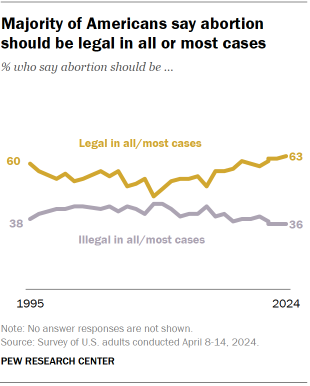
About six-in-ten (63%) say abortion should be legal in all or most cases. This share has grown 4 percentage points since 2021 – the year prior to the 2022 decision in Dobbs v. Jackson Women’s Health Organization that overturned Roe.
The new Pew Research Center survey, conducted April 8-14, 2024, among 8,709 adults, surfaces ongoing – and often partisan – divides over abortion attitudes:
- Democrats and Democratic-leaning independents (85%) overwhelmingly say abortion should be legal in all or most cases, with near unanimous support among liberal Democrats.
- By comparison, Republicans and Republican leaners (41%) are far less likely to say abortion should be legal in all or most cases. However, two-thirds of moderate and liberal Republicans still say it should be.
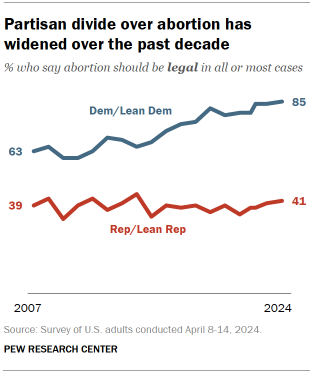
Since before Roe was overturned, both parties have seen a modest uptick in the share who say abortion should be legal.
As in the past, relatively few Americans (25%) say abortion should be legal in all cases, while even fewer (8%) say it should be illegal in all cases. About two-thirds of Americans do not take an absolutist view: 38% say it should be legal in most cases, and 28% say it should be illegal in most cases.
Related: Americans overwhelmingly say access to IVF is a good thing
Women’s abortion decisions
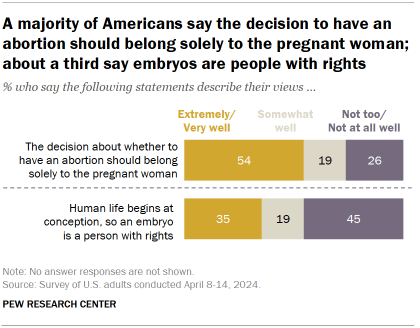
A narrow majority of Americans (54%) say the statement “the decision about whether to have an abortion should belong solely to the pregnant woman” describes their views extremely or very well. Another 19% say it describes their views somewhat well, and 26% say it does not describe their views well.
Views on an embryo’s rights
About a third of Americans (35%) say the statement “human life begins at conception, so an embryo is a person with rights” describes their views extremely or very well, while 45% say it does not describe their views well.
But many Americans are cross-pressured in their views: 32% of Americans say both statements about women’s decisions and embryos’ rights describe their views at least somewhat well.
Abortion access
About six-in-ten Americans in both parties say getting an abortion in the area where they live would be at least somewhat easy, compared with four-in-ten or fewer who say it would be difficult.
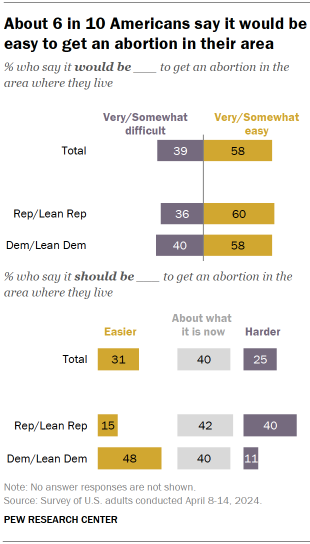
However, U.S. adults are divided over whether getting an abortion should be easier or harder:
- 31% say it should be easier for someone to get an abortion in their area, while 25% say it should be harder. Four-in-ten say the ease of access should be about what it is now.
- 48% of Democrats say that obtaining an abortion should be easier than it is now, while just 15% of Republicans say this. Instead, 40% of Republicans say it should be harder (just 11% of Democrats say this).
As was the case last year, views about abortion access vary widely between those who live in states where abortion is legal and those who live in states where it is not allowed.
For instance, 20% of adults in states where abortion is legal say it would be difficult to get an abortion where they live, but this share rises to 71% among adults in states where abortion is prohibited.
Medication abortion
Americans say medication abortion should be legal rather than illegal by a margin of more than two-to-one (54% vs. 20%). A quarter say they are not sure.
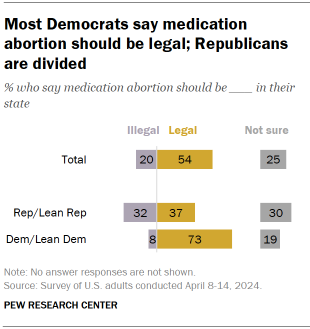
Like opinions on the legality of abortion overall, partisans differ greatly in their views of medication abortion:
- Republicans are closely split but are slightly more likely to say it should be legal (37%) than illegal (32%). Another 30% aren’t sure.
- Democrats (73%) overwhelmingly say medication abortion should be legal. Just 8% say it should be illegal, while 19% are not sure.
Across most other demographic groups, Americans are generally more supportive than not of medication abortion.
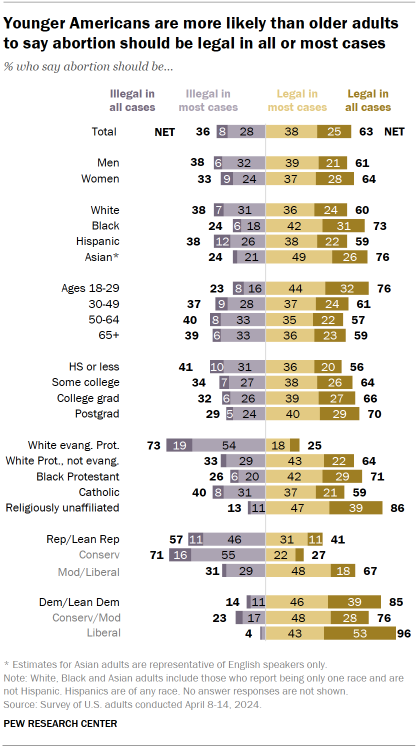
Across demographic groups, support for abortion access has changed little since this time last year.
Today, roughly six-in-ten (63%) say abortion should be legal in all (25%) or most (38%) cases. And 36% say it should be illegal in all (8%) or most (28%) cases.
While differences are only modest by gender, other groups vary more widely in their views.
Race and ethnicity
Support for legal abortion is higher among Black (73%) and Asian (76%) adults compared with White (60%) and Hispanic (59%) adults.
Compared with older Americans, adults under 30 are particularly likely to say abortion should be legal: 76% say this, versus about six-in-ten among other age groups.
Those with higher levels of formal education express greater support for legal abortion than those with lower levels of educational attainment.
About two-thirds of Americans with a bachelor’s degree or more education (68%) say abortion should be legal in all or most cases, compared with six-in-ten among those without a degree.
White evangelical Protestants are about three times as likely to say abortion should be illegal (73%) as they are to say it should be legal (25%).
By contrast, majorities of White nonevangelical Protestants (64%), Black Protestants (71%) and Catholics (59%) say abortion should be legal. And religiously unaffiliated Americans are especially likely to say abortion should be legal (86% say this).
Partisanship and ideology
Democrats (85%) are about twice as likely as Republicans (41%) to say abortion should be legal in all or most cases.
But while more conservative Republicans say abortion should be illegal (76%) than legal (27%), the reverse is true for moderate and liberal Republicans (67% say legal, 31% say illegal).
By comparison, a clear majority of conservative and moderate Democrats (76%) say abortion should be legal, with liberal Democrats (96%) overwhelmingly saying this.
Views of abortion access by state
About six-in-ten Americans (58%) say it would be easy for someone to get an abortion in the area where they live, while 39% say it would be difficult.
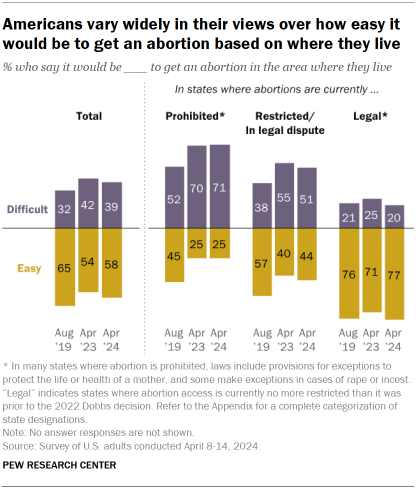
This marks a slight shift since last year, when 54% said obtaining an abortion would be easy. But Americans are still less likely than before the Dobbs decision to say obtaining an abortion would be easy.
Still, Americans’ views vary widely depending on whether they live in a state that has banned or restricted abortion.
In states that prohibit abortion, Americans are about three times as likely to say it would be difficult to obtain an abortion where they live as they are to say it would be easy (71% vs. 25%). The share saying it would be difficult has risen 19 points since 2019.
In states where abortion is restricted or subject to legal challenges, 51% say it would be difficult to get an abortion where they live. This is similar to the share who said so last year (55%), but higher than the share who said this before the Dobbs decision (38%).
By comparison, just 20% of adults in states where abortion is legal say it would be difficult to get one. This is little changed over the past five years.
Americans’ attitudes about whether it should be easier or harder to get an abortion in the area where they live also varies by geography.
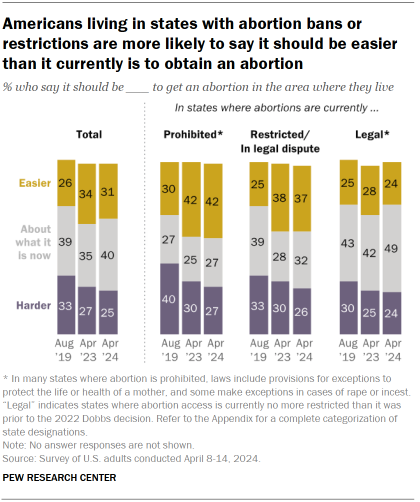
Overall, a decreasing share of Americans say it should be harder to obtain an abortion: 33% said this in 2019, compared with 25% today.
This is particularly true of those in states where abortion is now prohibited or restricted.
In both types of states, the shares of Americans saying it should be easier to obtain an abortion have risen 12 points since before Roe was overturned, as the shares saying it should be harder have gradually declined.
By comparison, changes in views among those living in states where abortion is legal have been more modest.
While Americans overall are more supportive than not of medication abortion (54% say it should be legal, 20% say illegal), there are modest differences in support across groups:
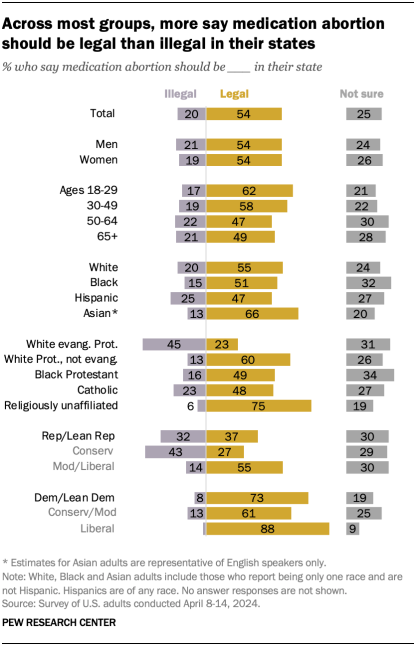
- Younger Americans are somewhat more likely to say medication abortion should be legal than older Americans. While 59% of adults ages 18 to 49 say it should be legal, 48% of those 50 and older say the same.
- Asian adults (66%) are particularly likely to say medication abortion should be legal compared with White (55%), Black (51%) and Hispanic (47%) adults.
- White evangelical Protestants oppose medication abortion by about two-to-one (45% vs. 23%), with White nonevangelicals, Black Protestants, Catholics and religiously unaffiliated adults all being more likely than not to say medication abortion should be legal.
- Republicans are closely divided over medication abortion: 37% say it should be legal while 32% say it should be illegal. But similar to views on abortion access overall, conservative Republicans are more opposed (43% illegal, 27% legal), while moderate and liberals are more supportive (55% legal, 14% illegal).
Just over half of Americans (54%) say “the decision about whether to have an abortion should belong solely to the pregnant woman” describes their views extremely or very well, compared with 19% who say somewhat well and 26% who say not too or not at all well.
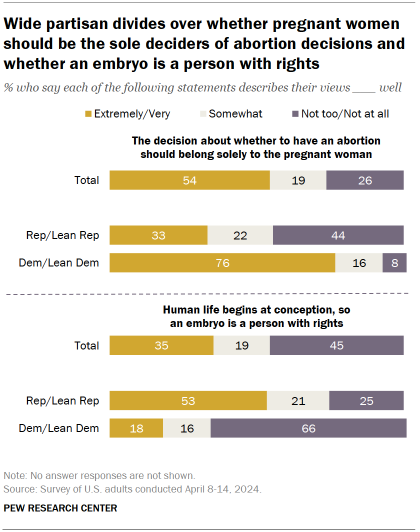
Democrats (76%) overwhelmingly say this statement describes their views extremely or very well, with just 8% saying it does not describe their views well.
Republicans are more divided: 44% say it does not describe their views well while 33% say it describes them extremely or very well. Another 22% say it describes them somewhat well.
Fewer Americans (35%) say the statement “human life begins at conception, so an embryo is a person with rights” describes their views extremely or very well. Another 19% say it describes their views somewhat well while 45% say it describes them not too or not at all well.
(The survey asks separately whether “a fetus is a person with rights.” The results are roughly similar: 37% say that statement describes their views extremely or very well.)
Republicans are about three times as likely as Democrats to say “an embryo is a person with rights” describes their views extremely or very well (53% vs. 18%). In turn, Democrats (66%) are far more likely than Republicans (25%) to say it describes their views not too or not at all well.
Some Americans are cross-pressured about abortion
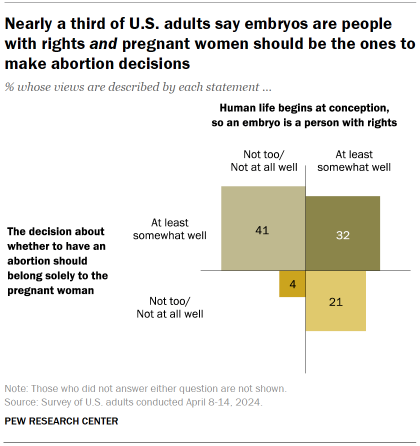
When results on the two statements are combined, 41% of Americans say the statement about a pregnant woman’s right to choose describes their views at least somewhat well , but not the statement about an embryo being a person with rights. About two-in-ten (21%) say the reverse.
But for nearly a third of U.S. adults (32%), both statements describe their views at least somewhat well.
Just 4% of Americans say neither statement describes their views well.
Sign up for our weekly newsletter
Fresh data delivery Saturday mornings
Sign up for The Briefing
Weekly updates on the world of news & information
- Partisanship & Issues
Public Opinion on Abortion
Americans overwhelmingly say access to ivf is a good thing, what the data says about abortion in the u.s., support for legal abortion is widespread in many countries, especially in europe, nearly a year after roe’s demise, americans’ views of abortion access increasingly vary by where they live, most popular, report materials.
1615 L St. NW, Suite 800 Washington, DC 20036 USA (+1) 202-419-4300 | Main (+1) 202-857-8562 | Fax (+1) 202-419-4372 | Media Inquiries
Research Topics
- Age & Generations
- Coronavirus (COVID-19)
- Economy & Work
- Family & Relationships
- Gender & LGBTQ
- Immigration & Migration
- International Affairs
- Internet & Technology
- Methodological Research
- News Habits & Media
- Non-U.S. Governments
- Other Topics
- Politics & Policy
- Race & Ethnicity
- Email Newsletters
ABOUT PEW RESEARCH CENTER Pew Research Center is a nonpartisan fact tank that informs the public about the issues, attitudes and trends shaping the world. It conducts public opinion polling, demographic research, media content analysis and other empirical social science research. Pew Research Center does not take policy positions. It is a subsidiary of The Pew Charitable Trusts .
Copyright 2024 Pew Research Center
- Dissertation
- PowerPoint Presentation
- Book Report/Review
- Research Proposal
- Math Problems
- Proofreading
- Movie Review
- Cover Letter Writing
- Personal Statement
- Nursing Paper
- Argumentative Essay
- Research Paper
- Discussion Board Post
Tips for Creating Impressive Persuasive Speeches on Abortion

Table of Contents
Speech is a great way to persuade someone that your position or viewpoint on a specific topic is correct and reasonable. But, creating a good persuasive speech is a challenging task. Especially, when you chose such a controversial topic as abortion.
There are a lot of questions about abortion and they are constantly discussed in society. Debates over abortion touches on different aspects like religious viewpoints, the legality of this procedure, and its morality. And to create a good-quality abortion persuasive essay , you need to know about all key points, rules, and best writing practices.
In this article, you will find all information about writing persuasive speeches on abortion. We will tell you about each step and share some useful tips. Keep reading to learn more!
Preparing an Abortion Persuasive Speech : Essential Steps
The process of writing any persuasive speech includes several steps. And all of them are equally important if you want to craft the best speech possible. Speaking of abortion persuasive essay writing, here are the steps you need to follow to prepare an exceptional speech:
- Research the topic. Before you decide what position to take in your speech, you need to learn as much information as possible about abortion and look at it from different viewpoints.
- Choose your side. Basically, there are only two sides you can choose from — so-called pro-life and pro-choice. The first side argues against abortion, and another side argues in favor of abortion as a legal right for every woman.
- Create a thesis statement for your abortion persuasive essay .
- Outline your speech. Write down all the points you want to communicate in your speech and organize them. Find the strongest arguments from all your ideas and use only them. Weak points will not help you to create a good persuasive essay.
- Create the first draft. We will talk about each part of a persuasive essay structure later in this article.
- Revise your speech and edit it. Polish your first draft by changing sentences, removing mistakes, and checking the logical sequence of all points. Repeat the process as many times as needed to create a flawless final draft.
How to Start a Persuasive Speech on Abortion
The best way to start your abortion persuasive speech is with an attention grabber. It can be interesting statistics, or an intriguing question, that will make the audience keep listening to you.
After the first sentence, you need to move to your thesis statement. Basically, you will argue for or against abortion and you need to clearly state it in your thesis. But, it is also important to provide the key point why you chose one side and not another. Use one sentence between the attention grabber and your thesis statement to ensure a smooth transition.

How to Present Arguments in a Persuasive Speech About Abortions
Now, let’s talk about the main part of your abortion persuasive essay — argumentation. Basically, the less you write, the better. The meaning is you need to remove all unnecessary information from your speech. Provide short, precise facts and arguments, without deviating from your main point. Every argument should be formulated in powerful sentences that will hit your listeners and make them think critically.
The best way is to present an argument and back it up with a few facts or statistics. If you think that your argument can be unclear, make sure you add one more sentence to better explain your point. Once you communicate one point, move to the next one, that is logically connected to your previous point.
Don’t try to present all your arguments in one speech. Choose no more than 3-4 arguments, and make sure they are the strongest ones. Otherwise, your listener will be bored with the length of your abortion persuasive speech and unconvinced of the validity of your position.
How to End an Abortion Persuasive Speech
The conclusion is extremely important in a persuasive speech. It is the last chance to reinforce your point of view. So, if you want to impress the listeners and make them consider your position, you need to choose the right words for your concluding sentences.
First, you can summarize your arguments, just to remind the listeners of your key points. It should be a short sentence where you just repeat all points one by one. And after this, you need to make a final statement.
There are a lot of options for how you can make it, and everything depends on what arguments you presented earlier. One of the most interesting ways is to end with a question that will make people doubt their position if it is opposite to yours.
Persuasive Speech About Abortion : Key Points to Know
We have already told you enough about the process of writing an abortion persuasive essay . But, the same with any type of essay, a persuasive speech has its special features. Here are some key points to remember if you truly want to persuade people of your viewpoint on abortion:
- As people usually listen to speeches, not read them, there is no place for abstract phrases and deviations from the topic. A persuasive speech should be precise, clear, and contain powerful statements and arguments.
- Use simple language, as people usually become less interested when hearing sophisticated words. No need to speak with too complicated phrases.
- Your words can be emotional and passionate. It will help to strengthen your message and evoke emotions among your listeners. Using formal, dry language in an abortion persuasive essay is not effective at all.
Final Thoughts
We have covered all essential points in writing a speech about abortion. Now, it’s time for you to get to work and create a persuasive speech. We hope our guide will help you with this task.
And remember, despite the fact that persuasive speech should persuade people, it rarely works like that. One speech is not enough to make a person immediately change their opinion on abortion. But, a good persuasive speech indeed can influence people and get them thinking further. And it should be your goal when writing an abortion persuasive essay.

How To Write The Best Paper On Police Brutality?

Pop Culture Essay – Thoughts on Writing

80 Great Compelling Argumentative Research Topics
Politics News

Mike Lee: Biden DOJ ‘Unjustly’ Persecuting Pro-Lifers, ‘Turning a Blind Eye’ to Leftist Crime
International Commentary

Common Sense vs. Antisemitism
Education Commentary

More Public Charter Schools Are Needed Nationwide
Law Analysis

Crime Is Rising. Expert John Lott Explains Why.
Security Analysis

NPR Reporter Assigned to Cover Posters Urging Illegals to Vote for Biden Won’t Answer Whether Aliens Voting Bothers Her
Politics News

DC Holds Training Sessions for Noncitizens to Vote
Law Commentary

Rural America Won’t Be Spared During Biden’s Immigration Crisis
Politics News

EXCLUSIVE: Here’s Where This Blue State Could Be a National Model for Election Integrity
Security Analysis

China’s Land Grab
Security News

US Is Failing to Counter Threat of Chinese Land Ownership, Report Finds
International Analysis

She Spoke Out in Defense of China’s Uyghurs, Then China Abducted Her Sister
International Commentary

Europe Must Stop Dragging Its Feet and Oppose Chinese Forced Labor
International News

Russian Troops Make Major Gains After Congress, Biden Greenlight Aid Package to Ukraine

A Bill to Ensure Fair Representation for American Citizens
Economy Commentary

‘Green’ Housing Mandates Push Americans Further Into the Red
Politics News

House Oversight Committee Probing Biden Voter Mobilization Order
Society Analysis

EXCLUSIVE: Federal Farm Credit Agency Plows Ahead With DEI, ‘Queer’ Farming

EXCLUSIVE: DOJ’s Kristen Clarke Testified She Was Never Arrested. Court Records and Text Messages Indicate She Was.

EXCLUSIVE: She Survived a Death Camp. Facing Biden DOJ Charges, She Is Prepared to Die in Prison

EXCLUSIVE: Congressman Calls on House to Pass Bill Banning Earmarks

Charge of ‘Genocide’ Is Blood Libel of Our Time
Education Commentary

Is the Spring of Anti-Israel Riots Transforming Into Based Frat Boy Summer?
International News

‘They Don’t Understand War’: Analyst Slams Biden’s Denial of Arms to Israel
Politics Analysis

This Is the Next Generation of Marxism

Stories of Young People Whose Bodies Were Sacrificed on Altar of ‘Gender Ideology Cult’
Society Commentary

‘SNL’ Gets It Right With Pro-Palestine Protest Sketch
International News
US’ Permissive Abortion Laws Highlight Need for Federal Protections, Study Finds
S.A. McCarthy / @pipesmoknpapist / May 09, 2024
Pictured: Matt Joseph, a pro-life supporter, stands outside the Supreme Court on April 24 as the justices hear oral arguments in Moyle v. United States and Idaho v. United States to decide whether Idaho's emergency rooms can be required to provide abortions to pregnant women during an emergency under a federal law known as the Emergency Medical Treatment and Labor Act, superseding a state law that criminalizes most abortions in Idaho. (Photo: Andrew Harnik/Getty Images)

Get your FREE digital copy of The Heritage Foundation’s Founders’ Almanac.
A recent study is declaring U.S. abortion law to be “far more permissive than the vast majority of the world.”
In its 2024 report on “Gestational Limits on Abortion in the United States Compared to International Norms,” published last week, the pro-life Charlotte Lozier Institute found that the U.S. is one of only eight countries in the United Nations that allows abortion on demand without any gestational limits, and one of only 15 countries in the U.N. to allow abortion on demand past 15 weeks of pregnancy. (The U.N. has 193 member states.)
The other countries that place no gestational limit on elective abortions include Australia, Canada, China , Guinea-Bissau, Mexico, South Korea, and Vietnam. Only 70 U.N. member states allow abortion on demand, meaning abortions “without restriction as to reason,” which the report also refers to as elective abortions.
The authors note, “The remaining 123 countries demonstrate a clear public policy preference for protecting human life over abortion by permitting abortion only under specified circumstances.” The U.S. is not among them, leading the Charlotte Lozier Institute to declare that current U.S. “abortion law is far more permissive than the vast majority of the world.”
Of the 70 U.N. member states that do allow abortion on demand, seven countries have pro-life protections before the 12th week of pregnancy, 38 countries have protections starting at the 12th week of pregnancy, 10 countries have protections between the 12th and 15th week of pregnancy, and only 15 allow abortion on demand beyond the 15th week of pregnancy, including the U.S.
Additionally, 46 out of 50 European countries in the U.N. have pro-life protections past the 15th week of pregnancy. The report notes, “The United States has a far more extreme abortion policy than those found in Europe.” Three countries in Europe (Andorra, Malta, and Vatican City) protect all unborn children outright, three others (Liechtenstein, Monaco, and Poland) have protections with exceptions to preserve the life or health of the mother, and the rest have various gestational limits placed on abortion.
The report chides: “0 European countries permit abortion on demand without gestational limits, as the United States does.” Even in France, which became the first nation earlier this year to enshrine a “right” to abortion in its constitution, abortion is restricted to the first 16 weeks of pregnancy.
The report notes that while the U.S. Supreme Court’s decision to reverse Roe v. Wade did away with federal license for the slaughter of the unborn, there is not currently any federal pro-life law protecting babies from abortion on demand.
“Consequently,” the report states, “29 states permit elective abortion past 15 weeks of gestation, and in at least 19 states, abortion-drug prescribers are shielded from legal repercussions if they ship abortion pills into those states that restrict abortion from conception and/or that have health and safety requirements that apply to abortion-inducing drugs.”
The report further notes that its “findings suggest that recent proposals in the United States to restrict abortion on demand past 15 weeks, which should serve as a minimum gestational limit, at the federal level would move the United States away from the fringe, ultra-permissive end of the spectrum.”
“Permitting abortion on demand past 15 weeks places the United States among the top 8% most permissive countries in the world (15 out of 193) based on gestational limits on abortion,” the report concludes. “The United States should seek to move away from the ultra-permissive fringe policies of the 14 other countries that permit abortion past 15 weeks and aim to protect life at even earlier gestational limits, as 178 other U.N. member countries do—ranging from complete protection of the unborn to protecting the unborn after 15 weeks of gestation.”
In comments to The Washington Stand, Mary Szoch, the Family Research Council’s director of the Center for Human Dignity, agreed with the Charlotte Lozier Institute’s findings. “The United States is the land of the free, where life, liberty, and the pursuit of happiness are considered inalienable rights given to each human being by our Creator, but at the same time, some states in our country allows unborn babies to be killed until the moment of birth,” Szoch said, adding:
Who lives and who can be legally killed by an abortionist should not depend on which state a person was born in. The United States should champion the right to life for ALL people, regardless of age, health, socioeconomic status, race, or any other qualifier.
The Charlotte Lozier Institute published its first report on “Gestational Limits on Abortion in the United States Compared to International Norms” in 2014. At that time, the U.S. was one of seven countries that allowed elective abortions past the 20th week of pregnancy, and one of only 59 countries that allowed elective abortions at all. Even among those 59, more than three quarters have pro-life protections past the 12th week of pregnancy.
The latest report comes as Republican politicians and candidates waver on the pro-life issue, despite calls from conservative leaders to stand firm in defense of the unborn. Democrats, meanwhile, have made abortion the chief focus of their 2024 campaigns , often accusing pro-life Republicans of “extremism” on the issue.
Originally published at WashingtonStand.com
Join the millions of people who benefit from The Daily Signal’s fair, accurate, trustworthy reporting with direct access to:
- Intelligence from inside Washington
- Deep policy understanding from over 100 experts
Don’t have time to read the Washington Post or New York Times? Then get The Morning Bell, an early morning edition of the day’s most important political news, conservative commentary and original reporting from a team committed to following the truth no matter where it leads.
Ever feel like the only difference between the New York Times and Washington Post is the name? We do. Try the Morning Bell and get the day’s most important news and commentary from a team committed to the truth in formats that respect your time…and your intelligence.

IMAGES
VIDEO
COMMENTS
Here are some facts about abortion that will help you formulate better arguments. According to the Guttmacher Institute, 1 in 4 pregnancies end in abortion. The majority of abortions are performed in the first trimester. Abortion is one of the safest medical procedures, with less than a 0.5% risk of major complications.
This essay adopts a pro-choice perspective, arguing that women should have the right to make informed decisions about their reproductive health, including access to safe and legal abortion services. By examining the importance of bodily autonomy, the consequences of restrictive abortion laws, and the role of personal beliefs in shaping abortion ...
As the long-running debate over abortion reaches another key moment at the Supreme Court and in state legislatures across the country, a majority of U.S. adults continue to say that abortion should be legal in all or most cases.About six-in-ten Americans (61%) say abortion should be legal in "all" or "most" cases, while 37% think abortion should be illegal in all or most cases.
Women (66%) are more likely than men (57%) to say abortion should be legal in most or all cases, according to the survey conducted after the court's ruling. More than half of U.S. adults - including 60% of women and 51% of men - said in March that women should have a greater say than men in setting abortion policy.
The Case Against Abortion. Nov. 30, 2021. Crosses representing abortions in Lindale, Tex. Tamir Kalifa for The New York Times. Share full article. 3367. By Ross Douthat. Opinion Columnist. A ...
11 Common Arguments about Abortion Nathan Nobis and Kristina Grob 27. 1 Introduction. Abortion is often in the news. In the course of writing this essay in early 2019, Kentucky, Mississippi, Ohio, Georgia, Alabama and Missouri passed legislation to outlaw and criminalize abortions starting at six to eight weeks in pregnancy, with more states following.
Since the Supreme Court's historic 1973 decision in Roe v. Wade, the issue of a woman's right to an abortion has fostered one of the most contentious moral and political debates in America.Opponents of abortion rights argue that life begins at conception - making abortion tantamount to homicide.
To this day, abortion laws still have opponents. In 2018, many states tried or did vote near-total ban. Alabama voted the most restrictive abortion legislation in the United States by allowing termination of a pregnancy only « to avoid a serious health risk to the unborn child's mother,' if the 'unborn child has a lethal anomaly' and if the woman has an ectopic pregnancy.
May 17, 2022. If Justice Samuel Alito's draft majority opinion in Dobbs v. Jackson Women's Health Organization becomes law, we will enter a post- Roe v. Wade world in which the laws ...
By Linda Greenhouse and Reva B. Siegel. Hardcover, 352 pages. Kaplan Publishing. List Price: $26. Read an Excerpt. Before the Supreme Court struck down many state laws restricting abortion in the ...
Legal abortion promotes a culture in which life is disposable. Increased access to birth control, health insurance, and sexual education would make abortion unnecessary. This article was published on June 24, 2022, at Britannica's ProCon.org, a nonpartisan issue-information source. Some argue that believe abortion is a safe medical procedure ...
Reproductive justice has always been more than just being "pro-choice.". To be pro-choice you must have the privilege of having choices. The fight for reproductive justice must be led by those ...
Reasons for an abortion can include rape, incest, or health risks due to pregnancy complications. It is also not always possible for couples to plan for a pregnancy, and birth control can fail or be misused. In these cases, abortions can be necessary to ensure that both the mother and her unborn child are safe and healthy.
In a free argumentative essay on abortion, you can look at the structure of the paper, choice of the arguments, depth of research, and so on. Reading scientific papers on abortion or essays of famous activists is also a good idea. Here are the works of famous authors discussing abortion. A Defense of Abortion by Judith Jarvis Thomson
5 Successful Abortion Essay Writing Tips. Tip 1 - Create the Paper Structure. Tip 2 - Outline Your Work. Tip 3 - Plan Your Time Wisely. Tip 4 - Find Good Sources. Tip 5 - Read Abortion Essays Examples. Do's and Don'ts of Abortion Essay Writing. DO'S. DON'TS.
P1 The 'direct wrongness of killing' concept is based on three principles: the reduction of a worthwhile life, violating an autonomous desire to live, and the production of fear or pain. P2 Killing a fetus does not violate any of the principles. C Abortion is morally permissible. These arguments show that the pro-life position that life ...
The arguments for the persuasive essay on abortion is wrong. You can operate these arguments in a persuasive essay on abortion should be illegal: The medical procedure is a risky one. The possible immediate and long-term consequences are sterility, heavy bleeding, damage of the cervix or womb. Abortion is an irretrievable action so a woman can ...
5.1.5 Abortion prevents fetuses from experiencing their valuable futures. We will begin with arguments for the conclusion that abortion is generally wrong, perhaps nearly always wrong. These can be seen as reasons to believe fetuses have the "right to life" or are otherwise seriously wrong to kill.
Persuasive Essay On Abortion. Decent Essays. 1619 Words; 7 Pages; Open Document. ... With the evolution of abortion laws and regulation through the decades, it is difficult to imagine the United States without conflict pertaining to abortion. Despite pro-life and pro-choice agendas, the country is in ever-changing opinion when it comes to ...
Nearly two years after the Supreme Court overturned the 1973 Roe v. Wade decision guaranteeing a national right to abortion, a majority of Americans continue to express support for abortion access. About six-in-ten (63%) say abortion should be legal in all or most cases. This share has grown 4 percentage points since 2021 - the year prior to ...
Debates over abortion touches on different aspects like religious viewpoints, the legality of this procedure, and its morality. And to create a good-quality abortion persuasive essay, you need to know about all key points, rules, and best writing practices. In this article, you will find all information about writing persuasive speeches on ...
Many people believe it is 100% wrong and even consider it to be murder. The definition of abortion is; "The termination of pregnancy by the removal or expulsion from the uterus of a fetus or embryo prior to being capable of normal growth.". These pro-life believers do not support the idea of abortion and believe it should be illegal.
Persuasive Essay On Abortion 807 Words | 2 Pages. Abortion has been a controversial topic in the U.S ever since it became legal in 1973 after the Roe v. Wade case. Abortion is defined as the, "the deliberate termination of a human pregnancy, most often performed during the first 28 weeks of pregnancy."
Persuasive Essay On Abortion. Abortion in America is a hot topic in today's society. With 1.21 million abortions in 2013 (Pro Life Action League), many people are starting to question if abortion should be outlawed. In 1973, the supreme court issued that banning abortion took away a woman's right to life, liberty, and property (Pro Life ...
A recent study is declaring U.S. abortion law to be "far more permissive than the vast majority of the world.". In its 2024 report on "Gestational Limits on Abortion in the United States ...